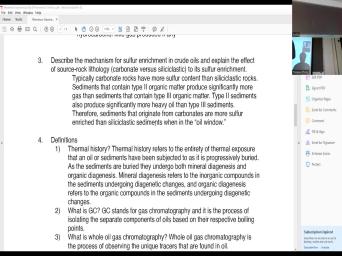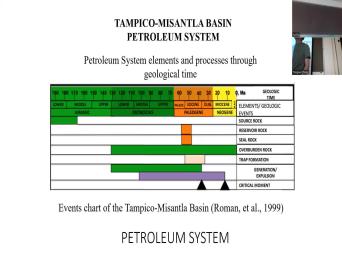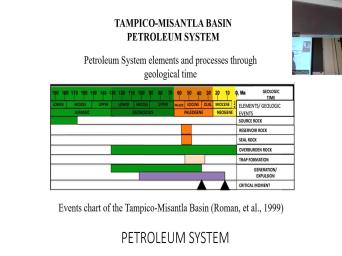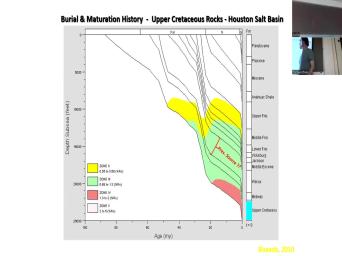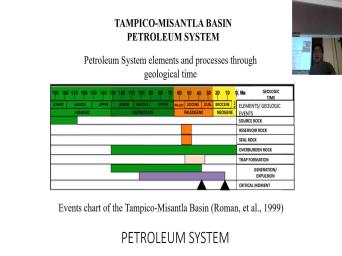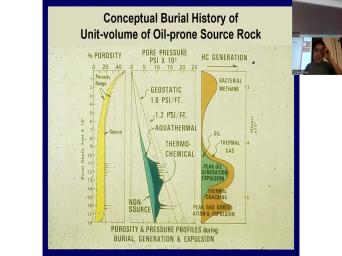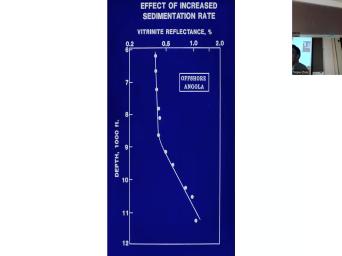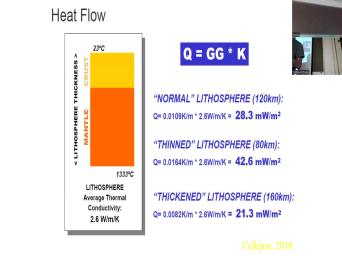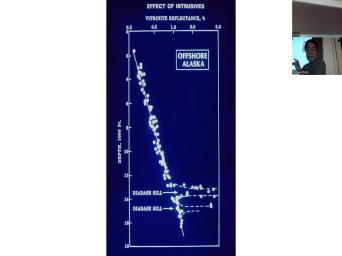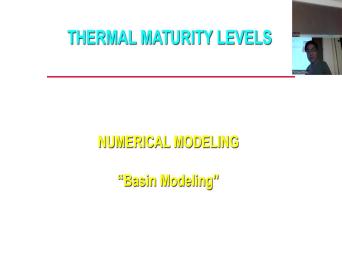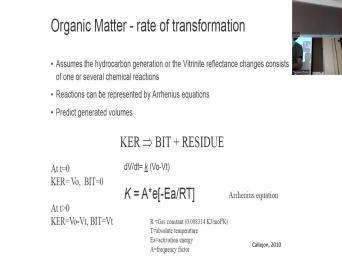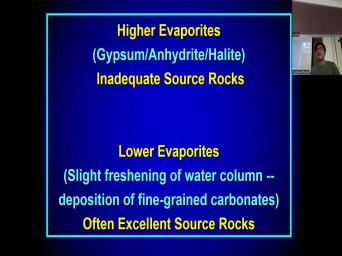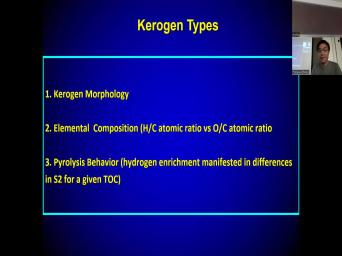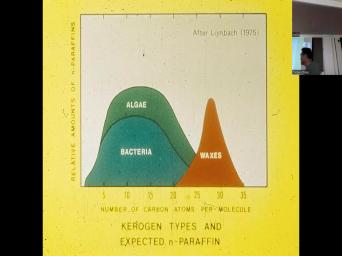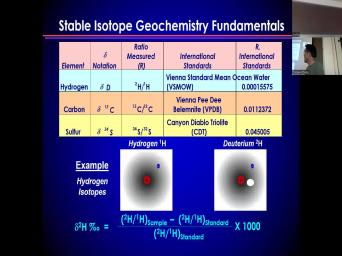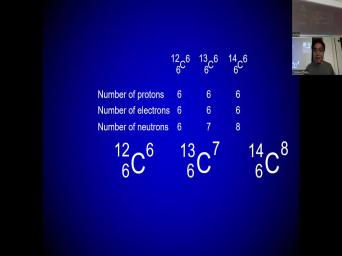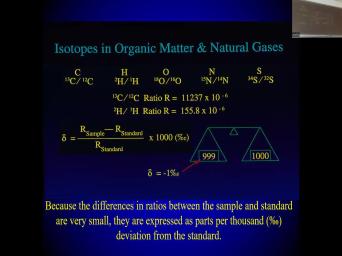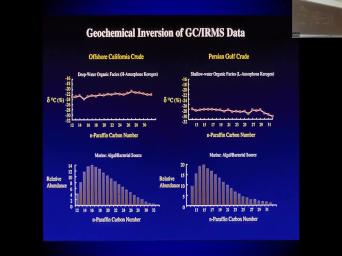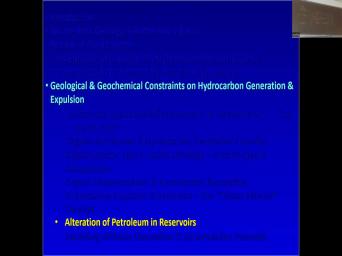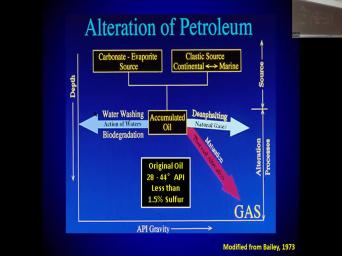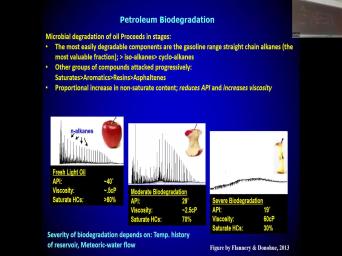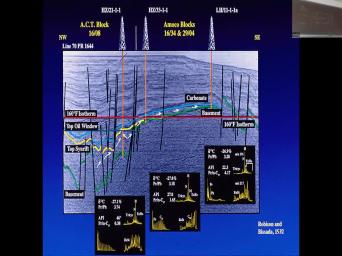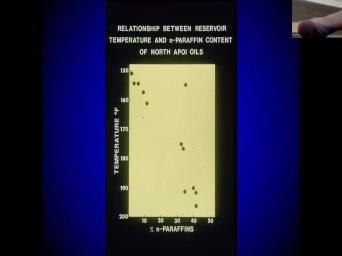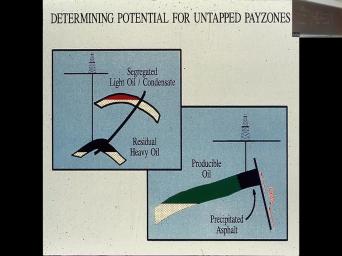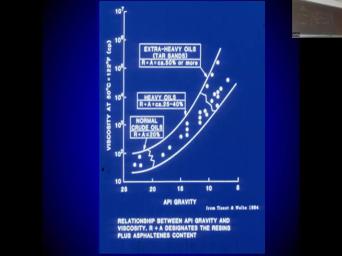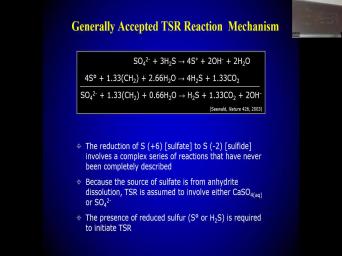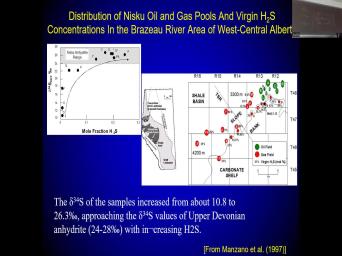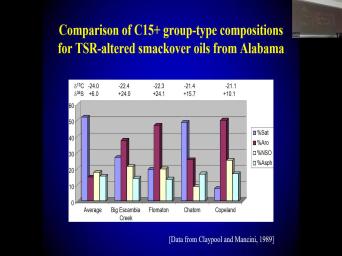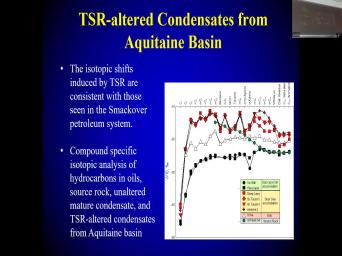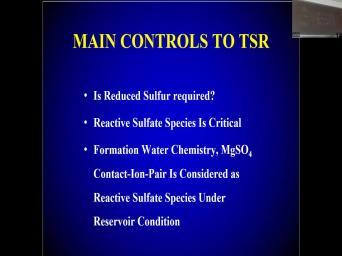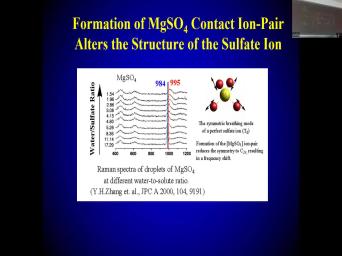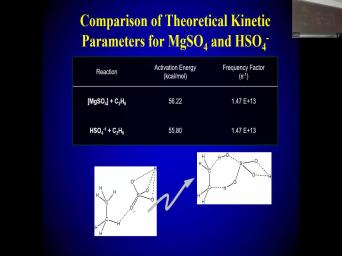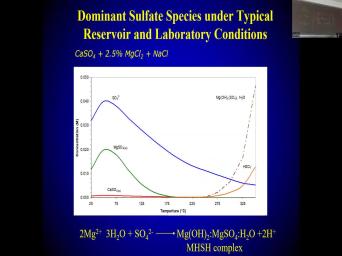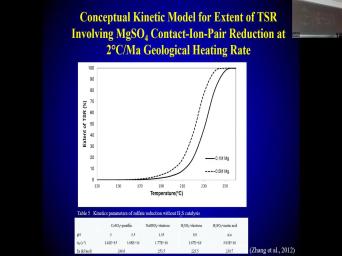| 00:09 | So sorry, sorry guys. And they fixed the, the zoom |
|
| 00:16 | And for the question three is both mechanisms for sulfur enrichment, include oils |
|
| 00:24 | explain the effect of the source li this classic to its sulfur enrichment. |
|
| 00:33 | the, the reason why I I it clearly that uh in this |
|
| 00:39 | I really want to explain to you understand why the car system versus this |
|
| 00:46 | system. The why is so will so rich system which the cabinet system |
|
| 00:53 | the Swiss classic system is not really . And we know that the, |
|
| 01:00 | some the the bacteria of the reduction occurring in both systems. And uh |
|
| 01:09 | it can be reduced and by the in the presence of organic matri in |
|
| 01:17 | systems. And the class six classic and the is reduced. The two |
|
| 01:25 | sulfide, hydrogen sulfide partially can be with the ions to form the pyrite |
|
| 01:33 | is the which is the because it depends on the depends on the depends |
|
| 01:39 | the concentration of iron concentration in the column and also in the cold water |
|
| 01:46 | the C class systems, there is the terri source input, which brings |
|
| 01:54 | amount of the irons in the in system as a result, the most |
|
| 02:00 | the hydrogen sulfide that will will be with form the paras. So, |
|
| 02:07 | and uh there, there's a very portion of the hydrogen sulfide that can |
|
| 02:12 | retained in the water column, which be incorporated to the organic matter resulting |
|
| 02:20 | the relatively lower concentration of the organic . In that is this classic |
|
| 02:29 | In contrast, in the carbon system different carb system and the iron concentration |
|
| 02:35 | is a lot. So the once hydrogen sulfide generic hydrogen sulfide can be |
|
| 02:42 | with the from the. But the is limitation is it still supply of |
|
| 02:51 | . So the the carbonate system, is why the result in the carbonate |
|
| 02:56 | , all the all have two car know, the the all the g |
|
| 03:01 | the bacteria, all those kind of ecosystems. But the the one gene |
|
| 03:08 | in the carbonate systems and the hydrogen that can be partially reactive is the |
|
| 03:15 | matter to form the organic reach So, and some of them reacted |
|
| 03:21 | the high rise. So that's why why you see that. Uh typically |
|
| 03:27 | see that more so than the this really good. But the the the |
|
| 03:35 | is not really interpretation is not really and the sediment contain type two organic |
|
| 03:41 | for significantly more more gas than the contain the type two, type three |
|
| 03:47 | it's actually that's a reverse. That be, that's the top three, |
|
| 03:52 | it. The organic matter is it we call the, the gas and |
|
| 03:58 | two called the oil, oil gas is good for the gas. So |
|
| 04:04 | sent, this sent that should be top two sediments are also in the |
|
| 04:12 | oil, then have three. this is uh some degree is a |
|
| 04:18 | but most time like top three, know, we talk about the oil |
|
| 04:24 | because the have very specific, very uh allergies, giving organisms in the |
|
| 04:34 | and which which we will be variable generate the heavier hydrocarbons, which c |
|
| 04:42 | carbon numbers. So it it's also the top three oil is that is |
|
| 04:50 | is actually contained a high content and also should be revered. Therefore, |
|
| 05:00 | that origin from cabinet are more so than the sediment. You know, |
|
| 05:11 | to see the accurate actually a AAA , when, when you get into |
|
| 05:17 | oil, once you get into the , the content, sulfur content in |
|
| 05:22 | oil from the fifth of this And uh the Communists is almost |
|
| 05:31 | The significant difference is very, really , really the the the very related |
|
| 05:38 | is in a more mature and immature oil. So that contain a much |
|
| 05:45 | sulfur content. Be the main reason because the, the the character character |
|
| 05:52 | actually uh in a common system. is the to the sour which the |
|
| 05:59 | fun. So this, this is , I think that that is the |
|
| 06:05 | I I say need to need to emphasize that about the key, key |
|
| 06:12 | , key mechanisms is not because of , because of the different type of |
|
| 06:19 | organic matter, type two, top , it's actually even the same type |
|
| 06:23 | the organ, top two character and the cabinet system versus the classic |
|
| 06:31 | That's, that's the cabinet system. because it's good for the organic sulfur |
|
| 06:37 | character formation. So that's a, the heritage, the heritage of the |
|
| 06:44 | sulfur in the organic matter car. uh the, when the organ similar |
|
| 06:52 | that the sulfur, higher sulfur oil the beginning, it's heavy, heavy |
|
| 06:59 | . And that is the, that, that is how, |
|
| 07:03 | how the, the that the sulfur cost in the, that's one of |
|
| 07:10 | , one of the mechanisms that because the rack li difference. So that |
|
| 07:21 | think that is one that, that that from answer is that the, |
|
| 07:26 | , the answer, you know, , I really found that that is |
|
| 07:29 | thing I need to just grab it you a little bit. And uh |
|
| 07:34 | the, for the, this I know that I didn't really clearly |
|
| 07:37 | said that about what is all oil graph is a process of observing |
|
| 07:47 | unique pieces that are found in It's that is some part is |
|
| 07:53 | It's what, what uh first thing all over uh graph is still a |
|
| 07:59 | C chrome but to use it for oil characterization. And uh the, |
|
| 08:06 | the, the method of what we is we, we put the oil |
|
| 08:12 | a solvent and that the all the dis orbit in the solvent chain. |
|
| 08:17 | we use CS two, you know two, that's carbon carbon sulfide. |
|
| 08:24 | reason why we use the CS two a much lower bowling point, the |
|
| 08:30 | point is about 45 degrees. So the, before the all the large |
|
| 08:37 | hydrocarbon become volatile and CS CS two solvent itself is have been evaporated. |
|
| 08:45 | that's not really interfered any kind of , any, any kind of |
|
| 08:51 | the last kind of picks when when when run the whole G C |
|
| 08:57 | . So the whole G C C still still is the gas back. |
|
| 09:04 | for the whole oil G C composition , then we can run, run |
|
| 09:12 | quantification and the identification on the Both. I think that's uh I |
|
| 09:22 | that is the key good 22 I found that that's the answer. |
|
| 09:26 | know, he, he didn't really do the type to type to |
|
| 09:31 | some, some, some as well not to. I try to explain |
|
| 09:37 | to and uh yeah, yeah, . So the first one and type |
|
| 09:48 | more commonly associated with it uh So uh you know, for the, |
|
| 09:56 | our system, yeah, we have rich system and we also have a |
|
| 10:03 | class which is so it doesn't You are, you are the what |
|
| 10:08 | of ocean? It really depends on , your supply of your, your |
|
| 10:14 | of the materials and also your depositional . There's two system. Both rich |
|
| 10:23 | is a system and that this class a rich, rich system. Both |
|
| 10:29 | be developed in a top two Yeah. But the is in a |
|
| 10:35 | rich system because the the iron content low in the water column also in |
|
| 10:42 | water below. So the gene, sulfide gene from bacteria. So actually |
|
| 10:49 | the no matter you are carbon, things happen. But the only difference |
|
| 10:58 | generate hundreds of the preservation of the way that the hydro generation |
|
| 11:05 | And for the carbon system system, think so far that it will be |
|
| 11:11 | the reactive to the organic matter Didn't reach that don't reach the |
|
| 11:18 | And uh the portion of you will reacted with the from the why the |
|
| 11:25 | did they put the the the the still available for the for the for |
|
| 11:32 | organic match for the sulfur reach the matter? Uh because uh because they |
|
| 11:37 | really low concentration of in the so a result, you have a higher |
|
| 11:48 | in the system. Oh So this a classic rich system, you, |
|
| 11:54 | still have bacteria reduction. That is equivalent to reducing. But so that |
|
| 12:03 | be very, very quickly consumed by pilots. Why that happens? Because |
|
| 12:11 | , you know, like if you on so they can be very |
|
| 12:15 | react to each other extension. So do not have too much available hydrogen |
|
| 12:23 | far in the water column and the water reactor in the organ market resulted |
|
| 12:31 | a low. So, yeah, a, that's, that's why I |
|
| 12:40 | , so or, and uh I'm going to shoot other things and other |
|
| 12:53 | all good in particular. You the I think the last two, |
|
| 12:57 | , I really want to let you that why the, why are |
|
| 13:01 | the the two time critical time moments you can read it from the burial |
|
| 13:08 | and they gave the reason and I that's you, you interpretation is |
|
| 13:14 | And also I ask you that, , that's about based on the barrier |
|
| 13:19 | and gave a specific formation and let to describe the sedimentary process, I |
|
| 13:29 | , I think that's all good and will stop share this one. |
|
| 14:18 | you know, this, uh last I put a, put a |
|
| 14:22 | it's in particular, you know, the question six on the question |
|
| 14:27 | And, uh I'm pretty sure I'm sure in the final exam, I |
|
| 14:33 | definitely not the same as same as , the, the, this, |
|
| 14:37 | , the, the this one, the same as this one, not |
|
| 14:41 | as this one but uh very very similar things which I will provided |
|
| 14:46 | the literature. And uh let you let you to apply your knowledge. |
|
| 14:53 | why I want to emphasize more about two. And uh yeah, for |
|
| 15:01 | one, you see that uh the , oil, the the those are |
|
| 15:06 | rock from this, from this same kind of church, same, |
|
| 15:13 | similar or same kind of chat I provided for in the final, I |
|
| 15:17 | to want to all the knowledge that learned from our system to to to |
|
| 15:24 | to to to your work in the . So the, you see that |
|
| 15:30 | , we have a petroleum elements of from the geological time. You |
|
| 15:36 | we, we, we have definition the petroleum and the petroleum elements. |
|
| 15:41 | have five petro soft rock rock, rock and the, and the the |
|
| 15:49 | seals. And uh also the process like a generation expulsion, migration, |
|
| 15:58 | all kinds of things. We, , we discussed the uh concept that |
|
| 16:02 | do that. Now it is, know, this, this is the |
|
| 16:05 | of the final product about the We want to definitely want to, |
|
| 16:12 | , to. So that's like this is actually developed really. So that |
|
| 16:21 | that is the rock. And if look at the red light actually develop |
|
| 16:27 | was and if you look at ra is developed at same time. And |
|
| 16:34 | the group, and uh I see you over it's actually the distribution and |
|
| 16:44 | the track information, half information is . It, it's actually, it's |
|
| 16:51 | very similar, very similar to your the, to the, to |
|
| 17:01 | the, the the 20 million extended very wide range and the indicated to |
|
| 17:13 | and our is actually developing field. means that is actually forms, forms |
|
| 17:20 | long period of time. And then have to look at the oil generation |
|
| 17:27 | to the oil generation, oil generation actually fast very which is 100 and |
|
| 17:34 | million years. And, and the until the, until what until the |
|
| 17:42 | minutes. So that the see the extortion eventually rather later than the because |
|
| 17:54 | early generation oil oil is you need meet the meet the absorption of the |
|
| 18:02 | . Yeah. So and that's why need more oil and that is 100 |
|
| 18:13 | and the generation 100 30 100 730 years. Ok. And then you |
|
| 18:25 | the, that means that if you have available types and uh if you |
|
| 18:31 | have available trap, eventually your oil be trapped and, and it after |
|
| 18:39 | yeah, and then that available, available property that here and we do |
|
| 18:46 | a critical critical time here. That because the end of end of the |
|
| 18:54 | information, this is one of the important critical time. That means if |
|
| 19:00 | , if you, this is the of the and then you see at |
|
| 19:06 | time, what happens in your and that will be a critical, |
|
| 19:13 | not critical time. And then this is OK. This is another time |
|
| 19:19 | this the end of the explosion and the explosion. That means that anything |
|
| 19:25 | this, if anything happens, if have a problem happens before this, |
|
| 19:31 | period of time, that's all And after this period of time, |
|
| 19:35 | no oil. So if you this the almost they can say, |
|
| 19:41 | if this system is OK, after 10 minutes, 10 minutes, the |
|
| 19:46 | 20 million years to now and those of time is not good for the |
|
| 19:52 | accumulation so that you can make this on this charge and not like |
|
| 20:06 | But like this kid you analysis that say that a OK. If, |
|
| 20:12 | the, let, let me, me see that if, if I |
|
| 20:15 | this one, if I move this to here and also those those two |
|
| 20:22 | and then you, your critical time is not here. I think that |
|
| 20:28 | , it really depends on your track . See here is the generation and |
|
| 20:36 | the end of oil generation is time is slightly slightly later than the |
|
| 20:44 | of oil and but is not But the the tap information is really |
|
| 20:53 | information is really this two are it's almost, that's true. That's |
|
| 21:02 | it's critical a second, critical And here is that there's no oil |
|
| 21:11 | , all expelled the about two million ago. So, anything, |
|
| 21:18 | if you see that you, if trust, suppose you have traps from |
|
| 21:22 | , from the family is good. there, it's good, but there's |
|
| 21:28 | chance for oil charge because oil explosion been ended at 10 million. So |
|
| 21:40 | , uh, you know, you , you learn, learn the issues |
|
| 21:44 | the OK, from here. Let, let us look at my |
|
| 21:49 | animals. So, OK. So been developed in the lower Jurassic. |
|
| 21:55 | great. And I have even much than in other, in other |
|
| 22:04 | You, you, this is all column in your mind. You, |
|
| 22:08 | your here so is here. much shallow. So and then you |
|
| 22:19 | also develop in the same time. and then, and then you, |
|
| 22:27 | oil generation, your oil generation is , oh your brother, you have |
|
| 22:32 | , you have a really good, , really good at that start from |
|
| 22:39 | years. That means that you, , you receive a significant amount of |
|
| 22:46 | rock as you are all and uh is not issue for this case. |
|
| 22:55 | then, and then the, the that the seal and open racks and |
|
| 23:03 | know that they all good and the trap, yes, they had a |
|
| 23:08 | and that's the, and then if look at the information, OK. |
|
| 23:12 | time is it is great because this before this develop, this kind |
|
| 23:20 | is the information that it, it the, the the time is just |
|
| 23:25 | , just a very good here once the the the red deposit and then |
|
| 23:37 | , then the end to the many that has been formed has been formed |
|
| 23:47 | the many years that before and then we look at our oil, oil |
|
| 23:55 | that, but that's all we have reached. And, uh, and |
|
| 24:04 | look at the path, the path from about 100 million years to and |
|
| 24:14 | look at and then you have there's a high possibility this track because |
|
| 24:24 | time, the timing is very If this truck supposed, if I |
|
| 24:28 | this truck here, the risk will high. This will be if I |
|
| 24:36 | the this part here, risk is as well. But that's travel from |
|
| 24:43 | early that he says, no, , no oil, these two cases |
|
| 24:53 | then the risk is very high. is very, why would it be |
|
| 25:02 | ? Yeah, it talk about at time, oil, oil generations back |
|
| 25:13 | 100 130 years ago, many years , 50 years ago, this kid |
|
| 25:23 | because the track, the track forms or that was a good thing. |
|
| 25:32 | what that, that, that could , that could be, could be |
|
| 25:37 | . But, and then you need think about that. If you, |
|
| 25:44 | the, the here is actually all learn from the right from here and |
|
| 25:52 | you see that you have very, , the, the, the the |
|
| 25:57 | there and then very just the slightly of the reservoir forms at that time |
|
| 26:04 | the reservoir form transforms and uh you not really have a oil, the |
|
| 26:11 | . Not that is still, I that's, that's about it. Unless |
|
| 26:19 | have something. This is really This is really good because it's all |
|
| 26:29 | , all the time. It's massive or so that's a very good |
|
| 26:40 | that's the one thing I want to want to. When, when we |
|
| 26:46 | final exam, I, I cannot this one and that is not good |
|
| 26:51 | you as well. Yeah, we , I will test, it's actually |
|
| 26:56 | , test, test means that we to know how, how good you |
|
| 27:01 | . And then if I, if make something, if I make something |
|
| 27:05 | the, the the is all I select one from the reference, the |
|
| 27:11 | , the many, many of those of things available in, in |
|
| 27:15 | you don't need to, you don't to, to, to read those |
|
| 27:19 | . If you have some, you read some reference to this system and |
|
| 27:24 | you really need to know. You need to understand how you can read |
|
| 27:35 | . And uh another, another you know, this is the, |
|
| 27:38 | I ask you you say, I it is uh which, what I |
|
| 27:42 | you to support the Bill cox have rack. The real have a, |
|
| 27:48 | you read this one, you see when you see that this, this |
|
| 27:51 | the, this is called I have formation names here. It's uh like |
|
| 27:58 | one. And this one, this is actually, and actually this one |
|
| 28:04 | OK, this, this one here the, and this one is the |
|
| 28:09 | , middle. And then this this one is the real, that |
|
| 28:15 | the corresponding each other. So you, you read it, this |
|
| 28:20 | , if you want to read real real is actually uh that's, |
|
| 28:30 | that's the, let me, let put the, the, the, |
|
| 28:33 | , the, the, the app you, OK? The same app |
|
| 28:36 | your app about 100 million years ago , or about 15 million years |
|
| 28:47 | And then continuously, you see that line, this is the cancer in |
|
| 28:58 | position in the range of this about 20 it's about 18 million years |
|
| 29:03 | to 22 million years ago. the, the sediment reach is |
|
| 29:09 | And then from here, you see , the slower actually from here to |
|
| 29:16 | . And then you use that, use the formation name or use |
|
| 29:20 | you use the, the to define . So the is is slow. |
|
| 29:32 | . And then what we see is about two million or one million years |
|
| 29:37 | we have a significant increase of the each. So you, you |
|
| 29:43 | you can, based on those you can get, get the, |
|
| 29:46 | read, read like this about Well, so the the direction is |
|
| 29:54 | on the temperature, right, and temperature is operational to the gap. |
|
| 30:02 | why would we see the curve Don't, don't. So I think |
|
| 30:12 | not. Yeah. Yeah, that because the, because, you |
|
| 30:17 | we have different definition rate and uh , the the what our maturity is |
|
| 30:25 | depends on the two things, maturity , we call the some maturity. |
|
| 30:30 | depends on the 22 factors. One about another one is, yeah, |
|
| 30:37 | why the that's why, you if you have a relatively, relatively |
|
| 30:42 | temperature but you have a longer time then you choose it could be equivalent |
|
| 30:49 | that very, very short term. uh but the, the higher that |
|
| 30:56 | that why you see that they see range, the, the this the |
|
| 31:00 | range and the green range or red they are shaping, shaping is not |
|
| 31:06 | not really the black line or Yeah, that's all difference on the |
|
| 31:12 | , different and the difference of the and also also the, |
|
| 31:21 | the, the silicon ridge is that's a true, that's why I |
|
| 31:38 | then any other question because this two in our final, we, we |
|
| 31:43 | have this kind of things. We it, it is not the |
|
| 31:47 | not definitely not the same on this , but we will use knowledge, |
|
| 31:51 | knowledge what we have we learn from here. And then like all |
|
| 32:04 | is someone who has not is actually . So that's I know like if |
|
| 32:16 | look at the real, that's another . You know, when we, |
|
| 32:21 | we talk about it, we talk the, the, the and uh |
|
| 32:27 | oil generation, all kinds of things the gas generation we will talk |
|
| 32:32 | So that's why if I have a , I will say, OK, |
|
| 32:35 | on this uh based on this various history and uh this history is including |
|
| 32:42 | the rocks. Yeah, in the , including all those kind of the |
|
| 32:47 | formation rocks. Then the graph Photograph is the, and then you |
|
| 32:53 | , OK, what happened about the . OK. And uh to this |
|
| 33:04 | is called, is called, which 30 to the 2028. OK. |
|
| 33:20 | then there is uh uh from this to here and then from the, |
|
| 33:27 | 14 million years old as a and everything, everything younger than that or |
|
| 33:49 | , every, every everything, everything the, to the it's about 30 |
|
| 33:59 | and it actually they do not really the window yet that something. And |
|
| 34:10 | we, we have a, this , this is our, you |
|
| 34:14 | you know, for real is not and then if we look at, |
|
| 34:18 | know, for real. OK. OK. Go there. Let do |
|
| 34:23 | all in the Zumba. That's the that, that, that's, and |
|
| 34:32 | and then to the, to the than that, then the, |
|
| 34:38 | the, the, the whole all really into or for this one, |
|
| 34:43 | this one is that the older generation going to happen? Yeah, that's |
|
| 34:57 | those things. You cannot really hear , but you have an idea |
|
| 35:05 | that this, that this formation increase a very short period of time. |
|
| 35:13 | , then that, that really increase signs that suggest that sediment real |
|
| 35:25 | right? That was just like, , that's uh it's still the the |
|
| 35:32 | in the high and referring it action referring that you, your signature which |
|
| 35:36 | high. OK? That is actually is back to this point. See |
|
| 35:55 | I think that the over burden overburden uh that is something what, what |
|
| 36:00 | guess. So the rock this is uh we say, OK, so |
|
| 36:10 | after this one, I don't know happens here after I do not really |
|
| 36:25 | otherwise, otherwise all from here, this one. So you for this |
|
| 36:33 | of thing, this table is what can see that here. OK. |
|
| 36:51 | else? It's, this is very simple. It's some, I I |
|
| 37:00 | some of them is the OK. , and, and then we watch |
|
| 37:20 | the, all the, the, , the history, what we, |
|
| 37:23 | we, what we show is we not really show the app yet in |
|
| 37:28 | , in, in the outside. . And, uh, I don't |
|
| 37:34 | to make that too complicated to you I want to have a relatively, |
|
| 37:39 | easy, simple system and in the , if you really work on the |
|
| 37:45 | basis and that more than you will that on that because if you have |
|
| 37:51 | , if you have some and for people and for this period of |
|
| 37:57 | we have no, no, any of and then, but the other |
|
| 38:05 | of things is too complicated. those are the relatively, relatively |
|
| 38:19 | So and then you inhabited the things the, about those, those |
|
| 38:32 | 33 still the concept was still right the show. So I, and |
|
| 38:45 | get so close to and then all here and OK, the additional cost |
|
| 39:08 | and uh no doubt all the pressure pressure and chance you have and |
|
| 39:21 | I gonna ask some of them and, and call that the abnormally |
|
| 39:28 | pressure. And then in order to that this is a kind of a |
|
| 39:39 | to concept to plot. OK, , OK, the reason, the |
|
| 39:44 | you have a higher pressure and the processing because that to the uh go |
|
| 39:57 | the, the pressure is amazing. the only three s are using the |
|
| 40:08 | . Hi. Yeah. So if want to buy the same on, |
|
| 40:15 | that, so we just give 33 . Yeah, but you, I |
|
| 40:25 | on that one, those two do affect even those, this not |
|
| 40:33 | So this is what we call Not a very that, no, |
|
| 40:44 | , no, already, not really to the AIS but better than to |
|
| 40:57 | . Yeah, I, I know you, you, you, you |
|
| 41:04 | thinking if you have a offshore, can watch a column and you |
|
| 41:09 | but the water column, it has pressure, the pressure will be lower |
|
| 41:17 | the ology itself. You need you need to cut that in a |
|
| 41:37 | . OK. This uh this concept reflections we we talk about, talk |
|
| 41:43 | a lot of this one and uh think this is a very important part |
|
| 41:48 | well. You need to, in , you definitely need to, to |
|
| 41:53 | the what, what means normal linear that there's a depth versus the original |
|
| 42:01 | that was suggested to us. And the the normal ones versus the normal |
|
| 42:10 | and all that tells us in particular in particular the the those those kind |
|
| 42:16 | the those kind of the the typical are not relate to the one and |
|
| 42:26 | need to, you need to you need, you need to explain |
|
| 42:30 | . And I because the like this very, very different but because of |
|
| 42:44 | it, use it. Yeah. That's a lot. If the normal |
|
| 43:02 | is actually very well, this, is about the intrusion the intrusion is |
|
| 43:14 | the, because, you know, the, the, the, you |
|
| 43:18 | a, you have a in, the formation that the effect effect, |
|
| 43:29 | only very few me above and below and is really high in that, |
|
| 43:39 | few meters range. Wow. I, all things, I think |
|
| 43:58 | the people that you have a, have a same, same kind of |
|
| 44:09 | or, you know, to, two, uh, which, which |
|
| 44:15 | blocks. Yeah, that's all the . What, what I think is |
|
| 44:33 | is the, that is one of things is that for the mature, |
|
| 44:37 | know, when, when the history you see the sediment different and then |
|
| 44:43 | sediment is different. Yeah, that's , yeah, this is very easy |
|
| 44:58 | understand, see that. And this is linear one and this one is |
|
| 45:02 | one but not really, really have same, I guess that that is |
|
| 45:13 | reflecting the and a couple of Why is it? Why? Oh |
|
| 45:22 | , those are so this one? , let, let me, let |
|
| 45:27 | check. This one have continuously, sent to. Yeah. And we |
|
| 45:34 | over there, I think. And line of that is very, very |
|
| 45:48 | when you think of the very very narrow version of reflection change what |
|
| 45:56 | tells us. Yeah, there's still sediment to reach the sediment to reach |
|
| 46:07 | faster here, much faster compared to of them. That's why we're not |
|
| 46:14 | not really see the increasing like this one, you know, we |
|
| 46:26 | , there's two real online and another is uh so, so that the |
|
| 46:37 | guys, this, this almost, , this uh on this side is |
|
| 46:45 | . The reason, the reason they different and also different, that's, |
|
| 46:54 | not good, that's not good enough go. It's actually maybe the good |
|
| 47:00 | is this one if you like, you have a, you know, |
|
| 47:08 | of your you have and then you , they do not really, really |
|
| 47:20 | uh all the of, of, , of the because we do have |
|
| 47:25 | people. The the the this is OK for the thermal gradients support support |
|
| 48:00 | formation thermal gradient. Uh We we, we check that the thermal |
|
| 48:07 | is is the heat flu divided by thermal conductivity. Yeah. Is he |
|
| 48:15 | by semiconducting secon activity is functional group no, no, no, the |
|
| 48:25 | its function of this knowledge because Suntone and they have this conductivity. |
|
| 48:32 | And uh that's functional and the heat heat blue. That is what |
|
| 48:37 | we learned the key point. What learned last week. It's uh it's |
|
| 48:43 | the you need to count the this so that's you see really depends you |
|
| 48:54 | think about that's really depends on your larger tectonic environment. Yeah, it's |
|
| 49:00 | really small things. Yeah. So you can see here is of |
|
| 49:05 | you have a similar is don't have different, it's uh yeah, |
|
| 49:18 | well up to that is that your, your, your sedimentary age |
|
| 49:24 | not have significant change. And uh bigger challenge for bridge instead of |
|
| 49:34 | but he, it's, it's for , for the base and given period |
|
| 49:38 | time. He is almost, that's , I think that's the key |
|
| 49:45 | The key key lessons of what I last week when they do. Do |
|
| 49:52 | have that one here? Yeah. look at this model, this model |
|
| 50:01 | that this is the that use the to Christ for this kind of concept |
|
| 50:08 | of instead of sickness of our best on, I do not really this |
|
| 50:16 | concept to introduce the normal and they about the 120 kilometers, those fences |
|
| 50:27 | uh for our sediment basin, many places, you know, five |
|
| 50:31 | , 10 kilometers our but still still about 10% of that. This is |
|
| 50:40 | that's why they call it the normal , thin ones and the ones that |
|
| 50:48 | how, how they they they they thinking about China. So this is |
|
| 50:56 | this concept, this this kind of . We we should, we should |
|
| 51:00 | that because this this this kind of clearly gives us a indication says if |
|
| 51:06 | really want to change your heat flow your base model, that means you |
|
| 51:12 | to have some evidence shows that your activities, everything is significant difference in |
|
| 51:19 | this age of can work can can to another age of rocks. Otherwise |
|
| 51:27 | your heat flow cannot really charge too . You need to have a |
|
| 51:34 | I I think this is very very important concept. And in this |
|
| 51:40 | , we not on the the heat , it depends depends on the depends |
|
| 51:48 | the heated conductivity and also some geothermal . And the gradient is a |
|
| 51:55 | I think Q we know that this of this kind of set, big |
|
| 52:05 | set. Yeah. OK. One the actual, let me see. |
|
| 52:15 | I have no I, so the know the your input is unusual for |
|
| 52:25 | the foil fielding North Sea, you there is volcano there in, in |
|
| 52:32 | . So you know that boy is follow this global pattern. How do |
|
| 52:39 | ? Yeah. Correct. Yeah, a good question. I said that |
|
| 52:48 | that means let me let me keep this one in mind. It |
|
| 52:52 | a very important concept for heat and that has to go back, go |
|
| 52:58 | here, go back to look at , this, this I don't know |
|
| 53:06 | big body of the, the this kind of in. And if |
|
| 53:14 | look at this, yeah, it's uh uh 50 page whatever. And |
|
| 53:26 | see that you, that you, the, the which so in the |
|
| 53:35 | , real abnormally high temperature don't affected here and the top and bottom of |
|
| 53:46 | very, it's still very narrow. I want to say that if you |
|
| 53:52 | have the significant volcanic in, in the, the area that the area |
|
| 54:03 | your, your, it's very narrow only the only the volcanic rock interacted |
|
| 54:13 | the, with the that range of this uh this kind of thing. |
|
| 54:20 | , yeah, I, I don't we will be significant kilometers at. |
|
| 54:31 | . It's, and then go to , go get into the best. |
|
| 54:37 | then this, this case, they really affected too much. If |
|
| 54:46 | if you put this one, let , let me, I don't know |
|
| 54:50 | you can quickly change, you change mind or make a another thing. |
|
| 54:55 | this is, this is vertically talk elementary nutrition. And even if, |
|
| 55:06 | , if I, you know, it in a map in a map |
|
| 55:10 | I suppose it's the area have rock in the base in one corner of |
|
| 55:18 | base. And uh how significant is , that one corner of the, |
|
| 55:25 | nutrition that one of the best will the, the center of the they |
|
| 55:37 | be small if you look at if you look at this, |
|
| 55:42 | this thickness and the only effect that very small of your interactive bras. |
|
| 55:53 | you cannot, it's even that you cannot really, that they not really |
|
| 55:59 | your pitch too much. What we here. We do not really affect |
|
| 56:05 | too much. No. Yes, , yes. What else? We |
|
| 56:24 | to share. OK. It's uh the equation and with Sarah and |
|
| 56:33 | this concept definitely will be definitely will in our final as well. And |
|
| 56:39 | reason why it, it is important because the, the, the the |
|
| 56:50 | similar to the oil which is and that we call the solid material. |
|
| 57:03 | . And uh that's the in the chemistry. When you think about |
|
| 57:09 | , what are, what are very concept is about that if we have |
|
| 57:16 | oil, the gas and just think just look at the the hydrogen carbon |
|
| 57:24 | atomic ratios for the gas is 42 the oil, which we use the |
|
| 57:36 | . So just look at that the , hydrogen medicine in the enrich the |
|
| 57:47 | . So it definitely definitely have to some uh some carbon will stay in |
|
| 57:55 | the as a as a which is that's that is that you understand that |
|
| 58:03 | , this kind of very simple, uh and then I say, |
|
| 58:09 | I come, yeah, OK. thing about that, that uh if |
|
| 58:16 | want to look at the rate of reaction, what happened is that the |
|
| 58:25 | of the change of the, of big, big time that that is |
|
| 58:35 | very important that yeah, that's a , very important a problem volume of |
|
| 58:48 | equal, equal to the, the volume change initially of the the |
|
| 59:01 | um and also the, and she which is great. So that is |
|
| 59:19 | , and, and uh once the proceeds chief in and the department, |
|
| 59:49 | see that the time the, and with that one there, and |
|
| 60:01 | this equation can be this way and the K of the energy and |
|
| 60:15 | but that's the, and here you that the activation energy that is |
|
| 60:24 | the energy to su supply the, break it down, break down the |
|
| 60:30 | carbon of the cat. So that's and then you, you, you |
|
| 60:36 | some linkage, linkage of the carbon to our organic type. They are |
|
| 60:42 | because different organic type, we have chemical composition. So that is uh |
|
| 60:48 | actually energy is related to our organic then which is, which is, |
|
| 61:03 | this is, this is how, important of this the the help us |
|
| 61:11 | understand the generation of the oil and from the. And uh that's definitely |
|
| 61:20 | want to, to know that I that's uh you know, I have |
|
| 61:32 | the most important is that what we ? Oh yeah. Another thing is |
|
| 61:39 | the original, it's very, very measurement for the history collaboration. And |
|
| 61:48 | that the rest of the rest of parameters, even the T MA still |
|
| 61:53 | as good as black direction if you have available data, which are and |
|
| 62:01 | you definitely try to use that data your thermal history. Uh kind |
|
| 62:09 | yeah, but when you do the you read the report of the rich |
|
| 62:15 | of Black, I already show a times about that time, the, |
|
| 62:22 | Excel Sheet or whatever. Since I the report is about, let's say |
|
| 62:28 | , each group of, you need at least 20 or 30 parts to |
|
| 62:35 | it. That's why, you and that's why, you know, |
|
| 62:39 | need to really find the microscope, identify, really clearly identify which one |
|
| 62:46 | work we have not really represent, the, the, the history of |
|
| 62:56 | rock of that, right? Because is before they transported to the |
|
| 63:07 | So they already already by the the summer evolution cannot be good for |
|
| 63:16 | for the and then, and then other things about other things about only |
|
| 63:27 | only which means that, that, is deposit or organ organic matter at |
|
| 63:34 | same time as a set, you what you call it that and can |
|
| 63:43 | used for the, this is this is a very important, very |
|
| 63:48 | slide out. And uh you need need to, to, to know |
|
| 64:04 | I think that's all that's all for , you know, first week, |
|
| 64:09 | week, the homework assignment is much . It's all builders try to |
|
| 64:15 | That concept is much, much easier the last week's assignment. Last week's |
|
| 64:21 | is uh it's the, in we have profile and the base modeling |
|
| 64:28 | the petroleum system. Those are things important. We try to uh try |
|
| 64:34 | use the knowledge which we learned from last two weeks to, to, |
|
| 64:41 | , to that, to this two . Yeah. Any, any |
|
| 64:53 | Yeah, go, go tell you more time. We definitely will in |
|
| 65:00 | final, it's not the same as one, but I will give you |
|
| 65:05 | , let you to let you to . And what is the critical |
|
| 65:10 | Why? And uh what the, each of the geological elements including, |
|
| 65:19 | know, when you say OK, is the Jurassic Jurassic, the, |
|
| 65:27 | , and look like this line is , the uh and the is and |
|
| 65:41 | the all open racks to rock and from lower that in the beginning of |
|
| 65:51 | pressure to, to the, to to, to present and the track |
|
| 65:59 | and, and the for to, that and, and yeah, that's |
|
| 66:07 | you can do that with all the time, 50 million years to not |
|
| 66:18 | any guess and the generation and for kind of those kind of things, |
|
| 66:26 | know, read, read all those . When you, you answer |
|
| 66:30 | when you answer the answer this slide uh we provide a different slide but |
|
| 66:35 | same kind of the concept, same, same thing here. This |
|
| 66:45 | the, this is the, the again actually know that the formation |
|
| 66:52 | uh those, those are the different geological, a different formation here. |
|
| 67:00 | uh this is a geological age. that's 7123444 all line up and then |
|
| 67:12 | see the curve and also about my , let me stop. Share this |
|
| 68:08 | . OK. And our class will cover the issues about the alteration. |
|
| 68:17 | know, we have an oil forms a but the various of of alteration |
|
| 68:25 | will destroy the oil quality. So I'm going to cover the cover because |
|
| 68:31 | is I think that this class will alteration of petroleum in. OK. |
|
| 69:02 | good. Yeah. And uh so oil was formed from the carro through |
|
| 69:11 | maturation and uh after accumulated in a and then that there will be various |
|
| 69:20 | processes can be out the oil quality is we call the alteration of petroleum |
|
| 69:27 | re so that and we know that , you know, we, we |
|
| 69:35 | about a lot of the sauce rack from today and tomorrow we will locate |
|
| 69:42 | oil itself and the petroleum characteristics can influenced by the numbers of factors. |
|
| 69:51 | know that organic type and source rocks affect the potential product composition. We |
|
| 70:00 | a took the lunch time to describe one and he is still some kind |
|
| 70:07 | the high level, the summarized we talk about them. And the |
|
| 70:12 | thing is that if we have a evaporate and including the gypsum Adra and |
|
| 70:22 | , and these are the inadequate source . If we, if we have |
|
| 70:27 | lower price and uh refresh, refresh indicate the slight refreshing of the water |
|
| 70:40 | and deposits the fine grade cabinet and are often the excellent source rocks. |
|
| 70:49 | we, we already show a lot times about the two very important parameters |
|
| 70:59 | effect a source rock evaluation. And mine is a which is organic |
|
| 71:12 | organic content. So it's, in words, if we should do the |
|
| 71:16 | rock characterization, abundance of organ matter is uh is one very important factor |
|
| 71:27 | is QC we talk about. And the second one is a total |
|
| 71:34 | potential off the rocks. So here see, you can see that high |
|
| 71:43 | uh I see the red red points actually have a lower and a lower |
|
| 71:52 | and the age on the mouth and on the very become very contains the |
|
| 72:02 | O C and the high uh generation . And we also uh divide the |
|
| 72:13 | become oil proof and the gas pro . And uh this is the summary |
|
| 72:20 | the cur. So we have a one, type two and type three |
|
| 72:26 | . And we use a different word the term called, called top one |
|
| 72:31 | a character. It's actually, you , that's a microscopy s characteristics show |
|
| 72:41 | offer and uh at car elemental That's uh so just that one contains |
|
| 72:48 | high hydrocarbon carbon ratios and uh also a high content which is uh deposed |
|
| 73:00 | marine and the Lucas shell, the and which have three is actually structurally |
|
| 73:09 | called a matter and uh chemically chemically composition content, the lower hydrogen carbon |
|
| 73:19 | , higher cell content and those are from the source. And uh they |
|
| 73:29 | have a mixed humi and gens which developing in the near and data |
|
| 73:39 | And those three kind of went through maturation, shut down oil that's from |
|
| 73:47 | one gen and oil and gas from two and the mainly gas from top |
|
| 73:56 | . So we know that gen types be characterized by three different methods. |
|
| 74:04 | is the morphology to use the organic graph. And another one is the |
|
| 74:11 | elemental composition, including carbon, atomic ratio and oxygen, carbon atomic |
|
| 74:19 | . And uh and the third which is a very useful one, |
|
| 74:24 | is a paralysis. So when when I talk about those three |
|
| 74:30 | I believe that you have a, have some plots in your mind. |
|
| 74:35 | . And uh those are the things , you need to to know that |
|
| 74:42 | for the morphologically classification of organic matter uh those are the results. And |
|
| 74:51 | you can see that the organic the the structures on the microscope is |
|
| 75:00 | different, know that have one knows that type two character knows that |
|
| 75:05 | three character. And also when you at the, the pyrosis which is |
|
| 75:13 | hydrogen index or oxygen index, once can see that shows up here. |
|
| 75:20 | uh and uh last week, I say that hydrogen index, oxygen index |
|
| 75:28 | rock rockery is it got a full parameters from Parader, which is S |
|
| 75:37 | S two S3 and the TMAX. uh and also, you know, |
|
| 75:44 | one and S two peak, we be separated even more the same, |
|
| 75:51 | more back use the PC. That what we, we did talk about |
|
| 75:58 | one last week. Those PC C don't need to know that one, |
|
| 76:04 | you definitely need to know the Is that what are four key parameters |
|
| 76:12 | for that? What each one represented and the index, oxygen index. |
|
| 76:23 | is the summary of the classification of and their depositional environments. And uh |
|
| 76:31 | have a current type one type two three and metal compositions which is the |
|
| 76:38 | pet graphic method. And uh the column is about hydrogen index which is |
|
| 76:45 | the rock paralysis and the the is is, which are and uh have |
|
| 76:54 | here and uh which is based on uh organic graphic environment of the rich |
|
| 77:03 | the indigenous indigenous of and uh also product which is generate the hydrocarbons, |
|
| 77:13 | we talk about the C 15, know, based on the C 15 |
|
| 77:18 | and look at that and uh corresponding the depositional environments and that this is |
|
| 77:25 | very good summary table. And uh hope, yeah. So four |
|
| 77:35 | Yeah, top four is, we do not that too much because |
|
| 77:40 | four is uh see the top ratio in is less than 50. So |
|
| 77:47 | almost uh no oil on a cat but today actually exist in. So |
|
| 77:57 | why the table including the and in , in our whole whole lecture, |
|
| 78:03 | do not really talk too much about this table that is a little gas |
|
| 78:11 | if if and also of the hydrogen . And uh if you look at |
|
| 78:17 | metals that, that yeah, top do not pay too much attention. |
|
| 78:26 | top four have 123. That is , that's the, that's a very |
|
| 78:31 | things. And I want to know and have 123. It's the, |
|
| 78:37 | the they are characteristics, the reason that is important because the that is |
|
| 78:47 | to our oil compositions. And uh know, the top one collagen type |
|
| 78:53 | collagen is that and the bacteria dominant organisms, the pre precursor that is |
|
| 79:01 | living organisms that is dominated by the and the algae. So the as |
|
| 79:06 | result, the other result, see oil mainly composed by the car number |
|
| 79:13 | than 6 25. So it's but is that if you take the |
|
| 79:20 | three and then you have, so is the, that's the kind of |
|
| 79:27 | why we see the the importance of current type of effect to the oil |
|
| 79:37 | , you don't have, you don't to remember those things. This is |
|
| 79:39 | those those kind of any anything, like those ones that will help, |
|
| 79:45 | us to build a concept in our . And once we say, |
|
| 79:49 | type one, type two, type , those are the those those those |
|
| 79:54 | important because they are contained a different carbon atomic ratios, oxygen carbon atomic |
|
| 80:04 | , which can be the the use the can be similar or as a |
|
| 80:12 | of the hydrogen carbon atomic ratio and carbon ratio use the rocky hydrogen |
|
| 80:19 | oxygen index. And uh why they they are they are different under the |
|
| 80:25 | . Under the microscope, you can their structures, chemical structures are |
|
| 80:30 | Yeah. And uh why they are because it's uh because they originally originally |
|
| 80:36 | are living organisms in for form, the different kind of the the the |
|
| 80:43 | matter is different. So this is whole, this is the whole things |
|
| 80:47 | we want to to you bring bring together in your mind. So organic |
|
| 80:52 | up. OK. That's quickly you say oh that organ top carbon ratio |
|
| 80:57 | high and uh it's dominated by the and bacteria and under the microscope. |
|
| 81:06 | we can see the structures is mainly mainly composed by the that some |
|
| 81:13 | And uh I think that's that's good and it is oil proof and top |
|
| 81:21 | is OK. It's also oil probe it contains also higher hydrogen carbon |
|
| 81:26 | atomic ratios and the hydro higher hydrogen . And uh it's uh it's also |
|
| 81:33 | from the organism or living organisms is by the bacteria and the algae. |
|
| 81:40 | uh that's the, it's uh it's good for the oil and gas |
|
| 81:46 | and pa recursion is dominantly composed by some high plant materials. And uh |
|
| 81:57 | those, those ones have a con lower hydrogen carbon ratios and the lower |
|
| 82:03 | index is good for the gas And uh if you look at the |
|
| 82:09 | the microscope, organ ma is dominated the high plus mass groups, I |
|
| 82:16 | that's the, those those things, know, once, once we talk |
|
| 82:19 | top +123 and then those information is to your mind and uh that's good |
|
| 82:27 | you don't need to. And also that those things, those, those |
|
| 82:33 | all help to help you to, bring this concept together. OK. |
|
| 82:45 | , we talk about the, the already. So another thing is about |
|
| 82:50 | still some concepts. The, the why we, we emphasize this things |
|
| 82:57 | that's later on, you will see we will use these things in our |
|
| 83:04 | . And uh for the talks. the definition is that this is the |
|
| 83:10 | and the nu contain the same number protons, but different number of |
|
| 83:19 | So the po I use the, , this this kind of element basically |
|
| 83:27 | at the mask. And uh and I represented the mass number and |
|
| 83:35 | represented the atomic number. And for is the, the carbon, we |
|
| 83:42 | a no, no atomic ratio, number is six. And uh they |
|
| 83:49 | three different kinds of uh this one uh have a contain another six |
|
| 83:59 | So actually the actually the mass with 12, I think this uh this |
|
| 84:09 | the, it still, I think is still to belong to a definition |
|
| 84:15 | . And uh from a, you to know, you need to know |
|
| 84:19 | we talk about. The, what means is and what definition, you |
|
| 84:23 | , like if you can give, , give an example in your, |
|
| 84:27 | me one sec, hold on. then we have really three, it's |
|
| 84:33 | the, the, the three important the one is the problem. And |
|
| 84:42 | for the oil and the, for the oil and uh they use |
|
| 84:51 | not, I use the third, have a, you need to, |
|
| 85:00 | , you need to also know that this type of notation on there and |
|
| 85:17 | you got and uh for, for head that's actually in the, the |
|
| 85:38 | , the better to the I don't the avocado and then, and over |
|
| 85:54 | over 4 to 32 the standard. these are three different standards for |
|
| 86:04 | each of the, each of the . And uh those are the standards |
|
| 86:13 | like ocean water and the the the , the basic standard? OK. |
|
| 86:23 | , B to hydrogen. This is this is the standard for the C |
|
| 86:28 | to C 12 and this kind of four to second two. And uh |
|
| 86:39 | . I'm happy to hear to see those are the delta D all due |
|
| 86:46 | the delta H two by referring to here equals two heavier ones divided by |
|
| 86:57 | larger ones for the samples. The minus standard standard is this one and |
|
| 87:05 | by the standard of the numbers So the reason why the why is |
|
| 87:13 | because the variation the difference between the sample is and the standards and the |
|
| 87:23 | is small. So that is why use time. So to make this |
|
| 87:29 | of data notation number is bigger is easy for comparison. So the point |
|
| 87:37 | which I want to want to to know that is for the stable of |
|
| 87:44 | fundamentals that is OK. And you that, OK, if I use |
|
| 87:57 | OK, now hi please if I the carbon as an example, all |
|
| 88:08 | that to replace the replace the of carbon sounds like. So if I |
|
| 88:16 | this is for hydro and that not 100 and now I I want to |
|
| 88:22 | at a better for the for this it looks like can replace the hydrogen |
|
| 88:35 | , I I would see how, good they are very good. Do |
|
| 88:41 | do that to be real. Let me, let me just put |
|
| 88:46 | . So that time, yeah. the true on the table? See |
|
| 88:58 | the, the notation is the, heavier because the, the abundance of |
|
| 89:04 | heavier carbon carbon or b of any of things of the, the heavier |
|
| 89:10 | side, the abundance of that, is much lower than abundance of this |
|
| 89:17 | lattice. That's, that's, that's lot I know to the better |
|
| 89:26 | So that's equals two. So there's about a sea for the to the |
|
| 90:05 | 557 seven. Um So that is the for the carbon. Hopefully it |
|
| 90:21 | me. And now I if I it to the sofa, can, |
|
| 90:27 | you if I change the sofa? this equation? OK. Cool and |
|
| 90:49 | . Yes. On Friday. Great. That, that is about |
|
| 91:00 | you say that it's actually if you this, this equation is a very |
|
| 91:15 | . Yeah, that's a, you that is that when we for |
|
| 91:21 | for the, for the, when marry the, as we marry the |
|
| 91:27 | , a mask abundance of the to abundance of the, that's that, |
|
| 91:36 | how we made ma ma and once measure this, it's no matter which |
|
| 91:42 | of sample, the maximum we measure carbon. So you buy see 12 |
|
| 91:55 | that to the and then at the ratio compared to this gap is standard |
|
| 92:05 | and then it to get the figure how that reach in the samples compared |
|
| 92:17 | the so that this is how if I trans translated to that means |
|
| 92:25 | enrichment of the samples to be Oh me to the standard standard is |
|
| 92:34 | standard? And that, that, , that right. What do we |
|
| 92:45 | to come here with the standard? the same with this ocean water? |
|
| 92:52 | . Yeah. No, no, , no, no that's, that's |
|
| 92:55 | the carbon. Yeah, this the think this is the one we use |
|
| 93:04 | ratio. Yeah, that's a good know be because you know the the |
|
| 93:13 | have many layers. Yeah, we many layer layers. We have many |
|
| 93:18 | better than similar, similar level with same level. You made many many |
|
| 93:22 | from different. And uh what when , when you talk about when |
|
| 93:28 | when you talk about it, they OK, it's a carbon 13 is |
|
| 93:33 | 0.1% and the current is about It can tell you this number. |
|
| 93:45 | will, you will feel difficult to . Yeah. And also difficult to |
|
| 93:51 | . And uh so it's actually, you married, you married, you |
|
| 93:57 | the abundance of the and abundance of black and uh you, you, |
|
| 94:10 | will remember that that that's kind of the the the the the numbers and |
|
| 94:15 | you report it, when you report , if you report that kind of |
|
| 94:20 | and uh the number is too no one really can understand it |
|
| 94:28 | it's very difficult to compare. So why, that that's why they come |
|
| 94:35 | . It's a kind of I have , everything you compare it to a |
|
| 94:44 | , that standard is fixed for the all the levels, no matter which |
|
| 94:49 | of level you have. The United in China. Look in the in |
|
| 94:52 | Europe, if you all use the kind of standard and better than your |
|
| 95:01 | to your standard. To think how you act of the, have you |
|
| 95:11 | of this international? So this is big, this is how the big |
|
| 95:19 | works, the communicator, you need have a communication language and the like |
|
| 95:27 | likely to be speaking speaking OK. if I first time come to |
|
| 95:34 | I say, OK, we he said, what are we talking |
|
| 95:39 | ? And then now after, after class to make three weeks of class |
|
| 95:44 | after the two weeks class and they , oh yeah, if I talk |
|
| 95:51 | OK, and that is a measure the extent of symmetry. If I |
|
| 95:58 | OK, you should have like 0.5 in our class. Yeah, you |
|
| 96:04 | like 0.5. OK. It's not the oil window yet. So the |
|
| 96:09 | not good. So you can make kind of communication. They are if |
|
| 96:17 | , if you say if you, you want to talk to buy |
|
| 96:20 | buy something, I will I will both richer. Oh, what did |
|
| 96:28 | read through that down? I do . You will use that. You |
|
| 96:34 | do that to them. Is that ? And, uh, the |
|
| 96:45 | the reason now we contract contract, know, you know, we don't |
|
| 96:59 | , ok, for the, we be very similar to what I talk |
|
| 97:13 | . Very, very, we talk , they talk about and we |
|
| 97:22 | we go 500 guests during the I know. And the you know |
|
| 97:34 | oil, oil. OK. Yeah, that right. Mhm And |
|
| 97:53 | for, for the, if I have I, how did |
|
| 98:10 | this is uh generation stage? Oh That, that, that all the |
|
| 98:38 | the only things you can tell is as a choice and I want to |
|
| 98:47 | a little bit of, little bit more knowledge for, for here. |
|
| 98:54 | uh if you look at the, at, look at the, the |
|
| 98:58 | binding in, in the process of start to assume the organic matter and |
|
| 99:07 | they will consume it very easily assuming push like eating the food, |
|
| 99:14 | some animals for eating the food. like the food. Yeah, because |
|
| 99:23 | , if I didn't turn on Yeah, that's, that's OK. |
|
| 99:29 | there's some, some delay, that's OK. So stage of the |
|
| 99:36 | organic matter react consumed by bacteria, consumed very easily, consume a portion |
|
| 99:45 | organs. In other words, in words, you know, we have |
|
| 99:49 | common bond in our organic PM that break down a very easy, very |
|
| 99:56 | about which is the container relatively. don't know about this because we know |
|
| 100:06 | carbon, carbon bonding determine the because massive smaller than 6 13, 13 |
|
| 100:16 | that balance is easier to broke in the reaction. So as you reach |
|
| 100:29 | time, he reached and, and , that's true. Awesome. Look |
|
| 100:46 | the common and I will leave this and we will, we will answer |
|
| 100:50 | question to the my, how much the should the oil and gas |
|
| 101:07 | No. So that's also break down carbon bonds like that kind of a |
|
| 101:19 | , carbon 12, 12. And you put more energy than the carbon |
|
| 101:27 | £30 to be. So as you , oil, we do generate the |
|
| 101:33 | gas have a search because uh because down in the bacteria process and now |
|
| 102:13 | not that hot. We will have also have a to Yeah, in |
|
| 102:26 | , that that is it the the oil then oil is not some |
|
| 102:47 | . We heat the temperature deeper, , very organ deeper. OK. |
|
| 102:56 | to strike again. Yeah. And there is not after that because high |
|
| 103:08 | that you graduate easily broke down because get up. That's the order. |
|
| 103:26 | quite cheap. Have an and also that time you have a message you |
|
| 103:36 | any OK? We have three stages data values. And you see the |
|
| 103:46 | enrichment of the 13 enrichment of data will be increasing from the gas through |
|
| 103:58 | oil window to drag. You can that. Yeah. So as a |
|
| 104:04 | , what you can see that it have any use of the in the |
|
| 104:10 | , you will be look smaller will smaller than, than, than this |
|
| 104:17 | . Yeah, and this one will smaller than this one because the enrichment |
|
| 104:23 | the sensor is getting it is stronger to the and all the people, |
|
| 104:43 | number that time that that that a values in this. Bye. Uh |
|
| 104:58 | associate the gas fuel in the middle be a case that generation in the |
|
| 105:07 | , the after oil crashing. And you see that actually how that you |
|
| 105:16 | that we have and then you can that. Oh uh-huh uh-huh, the |
|
| 105:46 | awesome. That's the best location and the range of. Oh OK. |
|
| 106:11 | . Wow. Mm I'm not getting . That's when you read this. |
|
| 106:27 | , you get that point. Mhm is how that is about the uh |
|
| 106:47 | talk to differentiate different kind of OK the organic uh after organ position, |
|
| 107:00 | the organ symmetric on our so it's hopefully get this and I hope, |
|
| 107:09 | hope that's uh you know, my gradually easier for you to, to |
|
| 107:16 | as a as chemistry is a for I I my whole career to |
|
| 107:29 | to work on this those. Uh oh, that's a good, |
|
| 107:42 | point is that we, we look that data values, you know, |
|
| 107:51 | called the, and that's, that's enrichment of the healthier in your |
|
| 108:17 | That's why, that's why, you , I, I, I hear |
|
| 108:20 | use enrichment for enrichment. So the English word is used for the our |
|
| 108:45 | of a system. So this, two kind of words, it's actually |
|
| 108:49 | all related to that data, that definition. Yeah, it's that is |
|
| 108:57 | what what you see here. It's you, you can definitely I think |
|
| 109:05 | the because when you look at the I originally Yeah. Alright, bye |
|
| 109:27 | to your pre what? Yeah. maybe is more, more meaning more |
|
| 109:38 | . So this process, you see this is the whole in order to |
|
| 109:42 | all this kind of the processes is that's only the one the process of |
|
| 109:47 | we are talking about. The the generation of the chemical reactions doesn't |
|
| 109:54 | increase that against the they are hydrogen trope will follow the same kind |
|
| 110:05 | as the carbon is the reason is you know, those are the co |
|
| 110:11 | are the all follow the chemical reactions uh the through the through the increase |
|
| 110:19 | the concrete, we have a significant conversion of your precursor to your product |
|
| 110:28 | all from your car to the oil gas. So this process is that |
|
| 110:33 | actually that's in the, uh, call, the con is controlled by |
|
| 110:39 | , the temperature dependent the reaction process , uh, uh, that this |
|
| 110:45 | will cause cause the astro fractionation we the. And that's a, it's |
|
| 110:55 | little bit more, that will be deeper, deeper, deeper part that |
|
| 111:00 | , the, the point, the of which I want to, to |
|
| 111:04 | you here. Just let you know . Why. Yes, that's |
|
| 111:22 | that's all me, all me guess chemistry natural gas. OK. That's |
|
| 112:00 | . And uh you know, this two concepts you, you need |
|
| 112:03 | know because the tops introduce the tops uh a little bit deeper. But |
|
| 112:09 | I'm not really ask you too much remember all these kind of kinetic fluctuations |
|
| 112:14 | is too much. But you need know, you need to know the |
|
| 112:17 | the definition of a tops and in as top geochemistry, we use the |
|
| 112:23 | , not what that data notation equation what that means. It relatively enrichment |
|
| 112:32 | heavier heart a to the standards, standards, the notation after this. |
|
| 112:42 | uh OK. This is uh this just to give you an example about |
|
| 112:48 | , carbon. Top three. that's a, that's a heavy, |
|
| 112:56 | brick. We, we have um materials this afternoon. And uh I |
|
| 113:06 | it's the, the, you just me about the, you know, |
|
| 113:11 | the, the for the many geologist chemist they're working on the geological data |
|
| 113:18 | the geological time and those kind of and they use the, use the |
|
| 113:25 | carbon and the carbon 14 is it's used, used for the environmental |
|
| 113:32 | a lot because, uh, because half life time for the carbon |
|
| 113:37 | much shorter, three years, I think it's 5000 years. |
|
| 113:44 | it's about 500 years. 14. used a lot for the, I |
|
| 113:51 | . Hm. Yeah, for the . And also for the, for |
|
| 113:57 | people who, who do the, , do the, do the research |
|
| 114:01 | the. Yeah, I called the pad stuff. You know, some |
|
| 114:06 | is that they, they use the to a few 1000 years ago. |
|
| 114:10 | people buried and, uh, they their bomb and then, then |
|
| 114:15 | the, the, they get some piece of that they are bone |
|
| 114:19 | whatever stuff and even the hair and they can take the management of the |
|
| 114:25 | tops of the carbon 14 because the 14 content abundance will be decay, |
|
| 114:31 | , decay with the, and then can determine the, the, what's |
|
| 114:37 | age of that kind of the, , the, the place 5000 years |
|
| 114:44 | considered small is small. Yeah. love is his love but he is |
|
| 114:53 | . Ok. Ok. Ok. is a, that is relatively |
|
| 115:00 | And, uh, you see that is the, this is third time |
|
| 115:05 | . It's good. This is the part. I, I, |
|
| 115:14 | you see the why data because that the the the change, that's |
|
| 115:20 | small, very small change, you it actually change it only one that's |
|
| 115:28 | 999. And uh and then if look at the ratio for that, |
|
| 115:32 | only minus one change. Yeah. what that's why the it's very |
|
| 115:40 | very small change if you, if say ok, 999 and the |
|
| 115:45 | if, if I report that 1999.2 you cannot really, really stupid, |
|
| 115:53 | don't know, 989, if you those things too much and people can |
|
| 116:00 | follow to follow the and if you , OK, by the small commute |
|
| 116:08 | to that, that means you only a one differences, the, |
|
| 116:15 | the of the and then if they to that, go to that, |
|
| 116:23 | to say OK, here's about here the that uh that uh it's about |
|
| 116:33 | the differences we talk about all those of very small, very small |
|
| 116:43 | So that is that I think this makes the, the, this last |
|
| 116:48 | , maybe, maybe help, help understand this, the del notation as |
|
| 116:53 | . And uh yeah, they, already show this one a different type |
|
| 116:58 | the source is actually formed, the , different uh all the composition of |
|
| 117:06 | oil that just shows how the C plus carbon distribution in, in |
|
| 117:13 | this is the of the oil and marine source, you see the vocabulary |
|
| 117:21 | the components, there's a two fewer two pi one here, those |
|
| 117:28 | those are called OK. You see , so that's the, the the |
|
| 117:38 | if I talk about this one, will become a say OK, familiar |
|
| 117:42 | know that I know that what data value is I say yeah, |
|
| 117:49 | This is the, you know that referring the different uh normal compounds contain |
|
| 118:01 | different yeah, number 13. So that individual, each individual and then |
|
| 118:15 | measure the aspect of the which which is the right one. Um |
|
| 118:30 | from the number of people on I know I'm not almost come to |
|
| 118:44 | the differences, the other one other this time, this time number 13 |
|
| 118:53 | 13. And so it's just just the same and then look at this |
|
| 119:08 | , this is another one. But can see that is you increase your |
|
| 119:14 | , your cover is actually increasing, and uh actually maybe suggest that they |
|
| 119:22 | not mixing cause. So you, can see that you consider that this |
|
| 119:30 | a, this is some of samples the river and the is about less |
|
| 119:39 | 9 26 and this one is the minus 20. So that different |
|
| 119:49 | different samples can do have different carbon sign signature. So that is |
|
| 119:59 | that is the, I think that a very important concept of tomorrow. |
|
| 120:04 | will use it and uh to, , to refer it. So |
|
| 120:09 | that is like for natural gas, just show that for natural gas. |
|
| 120:13 | you have a natural gas, it's, that's all composed by |
|
| 120:19 | How do you know that, that medicine is sourced from the biogenic |
|
| 120:24 | , less than all the generator from oil or me gene in the |
|
| 120:32 | Or do you know that the only you can do that is to measure |
|
| 120:37 | ass and then trace back and once that number, if you understand the |
|
| 120:44 | , then you OK, you management 70 per so oh we minus 70 |
|
| 120:52 | . That's a guess because why you make that statement quick because there is |
|
| 120:58 | people already do the many kind of studies and uh identify that minus 70 |
|
| 121:07 | less than minus 65 that is in so that once you, once you |
|
| 121:15 | that kind of, then you refer and same thing here if you have |
|
| 121:20 | accumulating in red and how do you that the oil is sourced from top |
|
| 121:26 | Carro or top two Carro or rich this system or all the classic, |
|
| 121:35 | it with all the, you need measure that you need to measure the |
|
| 121:44 | of the parameters of the or and trace it back to the, the |
|
| 121:52 | . So particle I is one of one of the important things and uh |
|
| 122:02 | another another to today, right? and I this one actually this this |
|
| 122:26 | to natural, it also have a , those are the things, those |
|
| 122:31 | the things, things that to, get the best, the the people |
|
| 122:37 | really work, work, work, on uh Joe workers working in the |
|
| 122:42 | . You need to, you need build all this kind of uh key |
|
| 122:47 | and model and say, OK, gene from top two characters and what |
|
| 122:53 | typical character. And then you need build up this kind of the the |
|
| 122:59 | be called the references, once you up this references and then say, |
|
| 123:05 | , my best produce all like You only have one sample from all |
|
| 123:10 | samples. How you can make story samples, how you can make |
|
| 123:17 | I do the wrong my I had , my company through the wrong success |
|
| 123:21 | little bit. Produce about uh you , 1000 barrels a day and in |
|
| 123:28 | and you, you make some say, OK, this is |
|
| 123:33 | how you come from and what you and what kind of are all kind |
|
| 123:40 | how you can do that. And you need to build up, you |
|
| 123:44 | to build up this kind of and this kind of phase, that kind |
|
| 123:50 | that kind of very, very or uh also, you know, |
|
| 123:59 | very, very different uh different secondary process in the build up this kind |
|
| 124:06 | uh reference. Once you have this build up and then put your oil |
|
| 124:12 | analysis and what, what the, the things they were doing and then |
|
| 124:18 | all the samples in the reference you know, different plots and then |
|
| 124:24 | have some ideas. So the, that that is how, how you |
|
| 124:30 | , how you can provide useful information your company and that your company realize |
|
| 124:36 | you are very useful. OK. uh for the rock for from the |
|
| 124:49 | topic, uh the, the, , this the, the, the |
|
| 124:52 | slides that talk about the set so can be formed from the, the |
|
| 125:00 | , reach the close and uh and ring reach the cause can be. |
|
| 125:07 | you said that, I think that said that we know that three which |
|
| 125:13 | a structures, yeah, is a character and some bass, they found |
|
| 125:20 | con sets condensate accumulation that is, is actually related to the core. |
|
| 125:28 | why they, that's why they, they are still the rich. And |
|
| 125:38 | there could be some degree of oil the at high completion or could it |
|
| 125:43 | space separation cause the and uh uh in the center accumulation and the impact |
|
| 125:54 | the disability of P S and the product, the product, crude oil |
|
| 126:00 | . And uh there can be uh heavy oil that can be a sulfur |
|
| 126:06 | , enrich the oil. And uh there, there are some uh some |
|
| 126:12 | source reduction in the oil reservoir, I the focusing few, few |
|
| 126:21 | And we already talked about this line this line is actually we, we |
|
| 126:27 | in our homework. We, we just let you know that how |
|
| 126:31 | different uh system, carbon rich system the system, the sour content in |
|
| 126:40 | oil will be different. And uh is a, this is a, |
|
| 126:47 | that I can see that that's at beginning, we have all the organ |
|
| 126:55 | usually have a he calls over the in the water column and in the |
|
| 127:04 | water, both of that. Um uh and that's that. And if |
|
| 127:33 | go to the carbon rich system and still, you know, through the |
|
| 127:37 | reduction, you form the hydro and part is the, the form and |
|
| 127:47 | still have a valuable hydrogen sulfide react the form that organ can reach |
|
| 127:54 | reach the car and I that have a high and if they continue the |
|
| 128:03 | of increased temperature and form the high if the further increased temperature sub, |
|
| 128:10 | know, see that high oil, crude oil, it can be also |
|
| 128:16 | be become low sulfur oil, the in the increase of the, the |
|
| 128:22 | because the hydrogen sulfide can be quickly from high over cut. I have |
|
| 128:30 | to read to their lower package. this is the how is this |
|
| 128:35 | This is actually this is so petroleum are influenced the mostly profoundly by alteration |
|
| 128:56 | the petroleum within the reservoir. In words, you know, it's the |
|
| 129:00 | generated from source rocks that is oil de determined by the current types, |
|
| 129:07 | by the maturity. Once they charge inter there are some alteration processes |
|
| 129:19 | And uh I try to look at alteration processes in the reservoir. |
|
| 129:24 | This slide, I I really want pay more attention about this slide. |
|
| 129:28 | is the the how how you can the alteration process is alteration for |
|
| 129:35 | We have a carbon and a classic continental all marine system. Those are |
|
| 129:45 | sauce. This is, those are sauce and then generate the oil after |
|
| 129:53 | accumulated in the you in a re know what happens, OK? That's |
|
| 130:01 | in the water of the water. of course, I I I did |
|
| 130:10 | one time as what was it can the oil and watch a contact |
|
| 130:17 | If the you know the oil and surface is like this. If you |
|
| 130:23 | a type of additional charging and then say additional water comes in and cause |
|
| 130:28 | oil water comes to service like Yeah, that's the water and then |
|
| 130:35 | degradation because the water will bring some to the river and will cause the |
|
| 130:44 | some portion of the oil and cause cause the oil to bad degradation at |
|
| 130:51 | side. That's a exit the I'm sorry. Look at this. |
|
| 131:01 | you, you can go to a and uh the form can perform the |
|
| 131:09 | gas actually to say, OK, the oil for the the and also |
|
| 131:20 | uh gene generation more gas. And got another process actually, the area |
|
| 131:32 | process if the maturation process mo mo the increase of the called the called |
|
| 131:42 | called the auto charge. And uh thing thing is about the increase and |
|
| 131:48 | temperature in the reservoir and also can called called the red and the oil |
|
| 131:57 | the organic oil and oil can be oxide by age. So this is |
|
| 132:06 | this this this is this is the of the this this slide. And |
|
| 132:14 | so this is a very important I definitely want to know that and |
|
| 132:18 | know that I I always put put the the description questions for you |
|
| 132:25 | your homework assignment. This will be alteration after accumulation and uh by the |
|
| 132:34 | the bacteria alteration reaching the didn't really at a lower out. And then |
|
| 132:42 | was the water? Water is really on the solubility of the organic, |
|
| 132:50 | oil components in the water. We that some oil components like aromatics have |
|
| 132:58 | much higher solubility in the water compared a so that the difference in the |
|
| 133:03 | . So change change the composition and gas, which is uh called the |
|
| 133:14 | that secondary gas check is actually like from oil charge and sometimes indued aspect |
|
| 133:27 | . And the garlic is a dish referring to the the thermodynamic cur and |
|
| 133:35 | the reduction which are occurring at high and between the high carbon and the |
|
| 133:47 | the car eventually. Yes, which talking about a lot occurring at high |
|
| 133:54 | the also some stability, not stable then some. So those are the |
|
| 134:04 | or six alteration processes. We definitely to know this slide. And uh |
|
| 134:14 | also to see here is a further about the petroleum fire degradation. This |
|
| 134:20 | a very important process because the degradation the oil process in the stages. |
|
| 134:26 | uh this just shows the shows the of the oil, the the oil |
|
| 134:34 | to the original. So this is those are all this, this, |
|
| 134:41 | is the original oil without any bio . And uh I I like the |
|
| 134:52 | apple level. You can see that the whole apple and the whole without |
|
| 135:02 | operation and then the has a very and then you see the to the |
|
| 135:19 | the idea that more you see that this point, this point, those |
|
| 135:27 | that increases the the yeah, not be consumed by bacteria. Yeah, |
|
| 135:55 | uh like we have an apple apple and a little apple but then |
|
| 136:01 | they eating apples and then without in without the consume and the US is |
|
| 136:13 | still still there. This is all by the you see the, the |
|
| 136:19 | gravity become 29 it also increasing and still have a 70% saturation. And |
|
| 136:29 | you go to here, this is same at the beginning. It such |
|
| 136:37 | what you can see that is all almost you cannot. And uh what |
|
| 136:47 | here is the from 14 to So what that tells us is that |
|
| 136:54 | , this one is very good very to the high court normally. |
|
| 137:01 | this one become heavier, become The oil quality is that it changes |
|
| 137:10 | and uh this increase to significant, a 0.5. This is the 60 |
|
| 137:16 | almost 100 times increase. Let me . Yeah, more than and |
|
| 137:25 | then the satu saturated hydrocarbons saturated carbons a 30%. You see that with |
|
| 137:33 | the degree of the degradation, the dramatically decrease representing the lower saturated |
|
| 137:46 | you know, there, you and uh further, yeah, we |
|
| 137:54 | this, this, this graph already what you can see that and the |
|
| 138:00 | all generation that are here and anything in the best and uh about about |
|
| 138:13 | the normal and then the and the uh and like this of the that |
|
| 138:33 | of and go to here got here the become 22. And uh c |
|
| 138:43 | system remains a very small portion of hydrocarbon is what you can see that |
|
| 138:50 | , this, this oil contains So the aroma is not good, |
|
| 138:56 | , good for the, the more to against. That's why, that's |
|
| 139:07 | they see the, the oil oil, oil quality change to imagine |
|
| 139:12 | . So when, when you drill well here as the original oil is |
|
| 139:17 | from over there. But, but the fact, I think this |
|
| 139:28 | we already did the show this one . I don't want to spend too |
|
| 139:31 | time for this one. And uh shows the different, this is |
|
| 139:43 | the oil and uh all that oil oil and go to the heavier |
|
| 140:04 | high and that we get the oil the hero when you normal car is |
|
| 140:18 | , this is another one that just the oh this is not the, |
|
| 140:22 | is the that or it's uh this not the old one is uh uh |
|
| 140:36 | , the oil and uh and the there for 32 days, they consume |
|
| 140:46 | kind of and this is for the , but there is still no more |
|
| 141:03 | for the and go to the, 44 days and they that so that's |
|
| 141:18 | natural level of observation compared to the , laboratory uh experimental bi degradation. |
|
| 141:25 | shows a very similar trends. those, those shows the process is |
|
| 141:32 | and uh original, very highly the . And this, this is the |
|
| 141:45 | original. And uh another another issue very interesting is that, so that |
|
| 141:59 | percentage of normal, the temperature and see that increasing, increasing of |
|
| 142:08 | the one smaller and smaller and the one and uh uh the, you |
|
| 142:18 | , your normal uh concentration curve, can get a really good corresponding to |
|
| 142:24 | sum shooting. And those shows the the oil gravity, the oil density |
|
| 142:32 | to the, correspond to the gas this, this area. And it |
|
| 142:37 | the uh so for the, the of the barrier depth and to and |
|
| 142:46 | , and the, and the increase the oil to be getting better. |
|
| 142:55 | is uh doesn't look at a comparison oil. You see, look at |
|
| 143:07 | , the diagram looks like different, uh proportional those and the saturate become |
|
| 143:29 | less. And uh as so, the no oil is actually only |
|
| 143:47 | This is one key study shows about in the north front of the Wilton |
|
| 143:53 | . And uh the oil variety, is that the oil gravity very |
|
| 144:05 | sad and uh all is increasing. if you look at content, that |
|
| 144:15 | another thing that content is that this I go towards this side is |
|
| 144:24 | And that is because of the, the increase of the summit increase of |
|
| 144:30 | chain, the sulfur, the oil less. Originally, originally, the |
|
| 144:37 | mature oil can be the 3% of sulfur. And once you reach the |
|
| 144:44 | off oil, the oil contribute will less than zero. And uh this |
|
| 144:52 | the shows some uh some concept to drawing about the uh type of those |
|
| 145:03 | of the and the, and uh line that should show the, the |
|
| 145:29 | . And because the black was is , the attack presentation and, but |
|
| 145:38 | the that is still that area still oil. Yeah, this graph, |
|
| 145:47 | spent some time to learn this graph actually look at this one that |
|
| 145:59 | Well, so that very deeply enough oil gas and everything I'm talking about |
|
| 146:15 | oil. It's, it's because that's pressure is high temperature is high |
|
| 146:21 | there's no separate gas, no all gas, all form the |
|
| 146:30 | the original original if this one and then cause the separation because the pressure |
|
| 146:43 | . So you have a and for get to the in the shadow shadow |
|
| 146:50 | and then you have the separation on , you have, you have this |
|
| 146:57 | of uh or separation process during the thing here, you, you directly |
|
| 147:06 | to have some and uh you could about the or something else and uh |
|
| 147:16 | separation. And then then for you can even more significant separation from |
|
| 147:25 | shadow from shadow. I think actually kind of technology that want to want |
|
| 147:31 | deliver from this slide. So this how the affect the, the uh |
|
| 147:42 | the oil for the on the gas . And uh this is the dash |
|
| 147:48 | after the 1.5 I I don't know 1.5 or two, that doesn't give |
|
| 147:57 | better idea that the, from the , the increasing of the and then |
|
| 148:05 | can see that clearly corresponding to a . This is, this is, |
|
| 148:13 | is very obvious in a, if go to a G I discover it |
|
| 148:19 | you before, from north to south the, the increase of bar |
|
| 148:24 | that's an unconventional play. And you a very clear separation of uh heavy |
|
| 148:31 | zone, normal oil zone to the condensate to the gas, to get |
|
| 148:37 | , very clear trend that qualify Yeah, this line is I |
|
| 148:46 | What is this for the oil? the was the and this is on |
|
| 148:57 | actually what you, what you is increase of the increase of the that |
|
| 149:09 | uh that, that, that that is, that is by |
|
| 149:14 | our and they, they have they have some publication about the ego |
|
| 149:20 | the, for the, the oil . I don't think you have time |
|
| 149:25 | read that one. I I hope have some time to show some of |
|
| 149:29 | result if I have time tomorrow. uh I think that's the the |
|
| 149:42 | Let let us have a very short and then I will get into the |
|
| 149:48 | of soft reduction. Yeah, let talk about another very important processes out |
|
| 150:02 | oil quality in nature. And uh is thermal chemical surface reduction. And |
|
| 150:10 | previously, we just show that on the body gradation affect oil quality that's |
|
| 150:16 | by the water of ocean. And bacteria of for this process is nothing |
|
| 150:22 | to bacteria is really related to the itself and also the heart temperature, |
|
| 150:29 | temperature. So this is the definition the T S R. The most |
|
| 150:37 | prominent a biogenic her biogenic alteration hot carbonate reservoir. That is the |
|
| 150:45 | of sulfate to sulfide coupled with the car carbons two carbon dioxide, which |
|
| 150:55 | determined as a thermo chemical action paid attention here and the whole thing about |
|
| 151:08 | process with nothing bacteria. And the thing is that is a in the |
|
| 151:20 | and uh and also including the in the reduction of the sulfide and the |
|
| 151:28 | of carbon to 202. So that can see that from the, the |
|
| 151:36 | the two products we are going to , one is about the hydrogen sulfide |
|
| 151:43 | another one is CO2 and uh and , and the hydrogen sulfide and CO2 |
|
| 151:50 | become a big risk for the for oil, this kind of oil reservoir |
|
| 151:57 | and development. So that's, that back to 2000. Uh yeah, |
|
| 152:04 | back to 2000 above. And uh that time, shale oil and shale |
|
| 152:10 | is not really come to the play . And uh that many, many |
|
| 152:19 | and gas exploration go to the deeper and uh and and that, that's |
|
| 152:29 | that is including the, including the and onshore at that time. You |
|
| 152:35 | , it's the based on our based on our current regeneration model, |
|
| 152:39 | know, that is the oil can similar stable in the oil window. |
|
| 152:45 | , oil and the battery beyond the window. If the oil controlled by |
|
| 152:50 | thermal alter, that is the product be condensate unnatural gas. But when |
|
| 153:00 | people start to explode in a deeper hot carbon reservoirs, some |
|
| 153:07 | they found a very high concentration of hydrogen sulfide. And the CO2 that |
|
| 153:14 | you as you know that and the economics become a, become, become |
|
| 153:18 | lower, the risk become much So that is back, that is |
|
| 153:23 | 2001. The people try to understand these processes are occurring. I that |
|
| 153:30 | that how I was involved in this study in a caltech. We try |
|
| 153:37 | look at the the key mechanisms to the this reaction in the sub subsurface |
|
| 153:45 | and how we can predict this this because once you can predict it and |
|
| 153:51 | you have a ability to avoid getting that area for your exploration activities. |
|
| 154:01 | also also if you really want you prepare for that say, |
|
| 154:06 | this will be going to be a hydrogen sulfide risk area and then you |
|
| 154:13 | for, for that and for your and for your product, the production |
|
| 154:19 | you need to remove the, remove hydrogen sulfide from your, from your |
|
| 154:25 | . And also hydrogen sulfide is toxic corrosive. And if you do not |
|
| 154:32 | treat well, they will cause issues safety issues. And uh there's a |
|
| 154:42 | general except T si reaction mechanism and you can do that is um look |
|
| 154:51 | , look at the, look at problem in the presence of the formation |
|
| 155:03 | form by the CO2. And you , and this, this reaction can |
|
| 155:14 | into two reactions which is with the and the, and there is |
|
| 155:26 | And so this is a very general of reaction and 2003. And uh |
|
| 155:40 | this means this means is that if you have a, if you |
|
| 155:45 | have, have the C I action and uh you need to reduce the |
|
| 155:54 | , which should have a proper balance six to the sulfur sofa, which |
|
| 156:03 | so minus two. So you see this is the, the, |
|
| 156:08 | the, the, the status is change from, from here to the |
|
| 156:16 | of the, it is the reaction this is a very clear, very |
|
| 156:25 | . I think we realize that and also the sulfate as we know that |
|
| 156:32 | the, in, in our we have the that developed, those |
|
| 156:38 | the main sulfate and uh your sausage to be dissolved in the, in |
|
| 156:45 | formation water to contribute to the, sausage ssl o uh the, |
|
| 156:58 | so, so I usually say, , maybe the soluble sulfate and |
|
| 157:07 | so those are the two factors control reaction. And uh also what we |
|
| 157:17 | here in order to take off this , you needed to the initial initial |
|
| 157:25 | sulfur species like so like a in to make the reaction go. So |
|
| 157:33 | is the statement, this is this is the, the, the |
|
| 157:38 | understanding, OK, This is the of we should get, they should |
|
| 157:43 | the show, the show, the the occurring in a and uh so |
|
| 157:50 | I just say that the because they the value of carbon resources because of |
|
| 157:58 | carbonation and will affect the the ratio result in a higher uh uh affect |
|
| 158:09 | and also affect the maximum depth of the oil occurs. We call the |
|
| 158:15 | data and as I said, hydrogen toxic of the of the corrosive and |
|
| 158:24 | can cause the, the the the can be corros. And in other |
|
| 158:29 | , you need to really, if really want to develop this, this |
|
| 158:33 | the deep of the oil and with higher to have a really a higher |
|
| 158:39 | pipeline good. And also also that need to remove the hydrogen sulfide before |
|
| 158:48 | , before you really sell, sell products to the, to the market |
|
| 158:53 | add the add additional cost to, remove the hydrogen sulfide. And uh |
|
| 159:04 | for the naturally the people over that that look at this, this |
|
| 159:09 | the scale of this six kilometers. uh what you can see that the |
|
| 159:17 | of what put it here, that the concentration of the hydrogen sulfide and |
|
| 159:23 | that concentration and so far in this is high and uh this is about |
|
| 159:30 | kilometers away, so six kilometers away then concentration become lower, it become |
|
| 159:37 | coin. So how how you can really can predict those things know that |
|
| 159:45 | that oil know that the oil do contain the hydrogen sulfide. No, |
|
| 159:51 | the oil field contain the low hydro that oil contain a high sulfur. |
|
| 160:01 | then the range here is it about over all from here to there is |
|
| 160:07 | than less than 20 to 30 kilometers . And the boundary between the high |
|
| 160:13 | the road, the hydrogen sulfide, oil, it is less than three |
|
| 160:19 | . So this this make the prediction very difficult. It clearly suggest that |
|
| 160:27 | suggest that the temperature is not only factor. So how you can have |
|
| 160:32 | really significant temperature change to cause this so that the temperature is not the |
|
| 160:38 | factor. So the if you make make the, we really cannot |
|
| 160:44 | really, really see that too much here to something else, which is |
|
| 160:50 | we talk about. And once you see that also the next one that |
|
| 160:57 | that now you can get you can you look at this, this part |
|
| 161:01 | say, oh yeah, I this is for me other content and the |
|
| 161:14 | which is the standard, the standard actually my phone either drink or the |
|
| 161:53 | site drink decreasing over the. So is this is this is very, |
|
| 162:08 | good observation that go go he is is. So this give you another |
|
| 162:27 | see that the is is useful and for us to make uh some |
|
| 162:35 | OK. And uh I don't want to remember these things, but I |
|
| 162:41 | I want you to understand this Yeah. And so this shows the |
|
| 162:47 | act of change of the oil and gas. OK. Is that means |
|
| 162:53 | organ uh all the organic or the in the water, OK? In |
|
| 163:02 | water and the with the sea water through the microbio sulfate reaction and the |
|
| 163:17 | to the to the generator product. , so high and organic. |
|
| 163:24 | so you can understand why this process taking place. Yeah, because bacteria |
|
| 163:30 | the reduction in A and A is ions from the and the so called |
|
| 163:40 | interaction reactivate the organic matter to form organic reach. So that is how |
|
| 163:53 | then then go to the go go the the further further you know, |
|
| 163:59 | water with some you know, you organic. So and then then you |
|
| 164:07 | the further in the in, in hot water. And uh still we |
|
| 164:13 | the can be went through the bi reduction and uh released some hydrogen release |
|
| 164:23 | CO2 and form some additional hydrogen So on the p one thing those |
|
| 164:32 | in the water column is occurring in water and the shadow sediment as |
|
| 164:38 | And as a result, as a will formula I for and I and |
|
| 164:48 | the early stage and the, the back and generate the sulfur |
|
| 164:56 | high sulfur country in the oil, is yeah. And then before |
|
| 165:01 | before they go to this station and action you will continue to, to |
|
| 165:06 | a lot of oil that immature oil release the happiness of. So let's |
|
| 165:14 | that, think about that during during the early oil generation and uh |
|
| 165:20 | sulfide is released arch from the high carro and uh as the sulfide and |
|
| 165:28 | oil is become a sulfur because the sulfide has been released. Hydrogen sulfur |
|
| 165:34 | been released as hydrogen sulfide. And for the, this this range is |
|
| 165:44 | if you have a involved in and have a more mature, involved in |
|
| 165:53 | car and generate the additional sulfide on sulfur that's through the thermo chemical production |
|
| 166:01 | much deeper. It's even beyond the of and from the look at |
|
| 166:10 | what, what's the result form that mature oil? That is a higher |
|
| 166:16 | sulfide and also comes with the higher in this oil actually because you generate |
|
| 166:23 | sulfide and the react reaction, the occurring here. But, but here |
|
| 166:29 | that with the oil and then increase sulfur content in the oil and even |
|
| 166:35 | , the, the all the high oil but still have a higher because |
|
| 166:42 | was because of this. Ok. one is just to look at the |
|
| 166:59 | the C 15 class groups type of for the T S R or the |
|
| 167:08 | from, from Alabama. And uh are the different fields and they indicate |
|
| 167:14 | different kind of the different kind of alteration of the, the, the |
|
| 167:21 | phone. The, the what you see that we have and, and |
|
| 167:31 | of the oil and second line what you can see that here and |
|
| 167:37 | actually the old, much greater. , so that in a range |
|
| 167:44 | and then you look at the, at those, those ones and |
|
| 167:49 | the, the, the blue one , and the red is a and |
|
| 167:55 | yellow is the, and the, , the uh actually what you can |
|
| 168:05 | that actually, actually you see the, the here are all the |
|
| 168:11 | contains a much compared to the also including all contains the much lower |
|
| 168:33 | to the original original and uh such increasing the Ame and there is some |
|
| 168:43 | of increasing of unless, unless will outside there that know that how |
|
| 168:51 | how the T SI can significantly alter oil composition. OK. This will |
|
| 169:01 | even more, little bit more. you so much. It, it |
|
| 169:10 | be more complicated what you can see we have a T S R on |
|
| 169:17 | this is the black to black And also we have uh we have |
|
| 169:23 | T S R oil which is the , red point here. And what |
|
| 169:29 | can see that is after the, those are all the this is from |
|
| 169:39 | all these and this is the all, all that. Uh and |
|
| 169:50 | you can see that uh no matter components after T S R, after |
|
| 169:57 | S R and the carbon all become , the the the the remain |
|
| 170:07 | What you can see that that is because the after after the products, |
|
| 170:16 | from organic is of the products of products of the car after P S |
|
| 170:28 | is what kind of form of the , they are coming by Oxide Bridge |
|
| 170:38 | what you can see that what you that is uh just run, you |
|
| 170:43 | , just run your mind that run mass balance a little bit. We |
|
| 170:49 | an original carbon, original oil carbon have much less smaller numbers. And |
|
| 170:59 | reaction after P S R reaction, the carbon ice talks of the oil |
|
| 171:06 | heavier. In other words, there be more carbon enriched in the T |
|
| 171:15 | R or how much product of the . What are your expectation of the |
|
| 171:23 | the carbon light or heavy based on mass balance, think about a little |
|
| 171:38 | the mass balance. So initially it and uh and then you know, |
|
| 171:46 | reaction and then you, you move up to here, you lose |
|
| 171:50 | Yeah, you lose something. So , those, those lost of |
|
| 171:56 | some of them become 02. So carbon I should be. So that |
|
| 172:02 | what? Yeah. Yeah. So come in this, it's about minus |
|
| 172:15 | or something for the, that's But the reason I, I want |
|
| 172:20 | pay that little bit of attention because uh you know, uh I try |
|
| 172:24 | let you, I'm not, not ask you to remember all these things |
|
| 172:27 | you don't need to remember all these . What do you really need to |
|
| 172:31 | this process? This process? So be reduced, oil itself will |
|
| 172:41 | oxidized to and remain the oil to enriched in the 13. So the |
|
| 172:52 | of the CO2 should be in, C 12. Yeah. So that's |
|
| 172:58 | last. So let us look at main controls of the P S. |
|
| 173:10 | that's supposed to question them is to the phone that is uh initially use |
|
| 173:16 | like a hydrogen sulfide or animal sulfide to be existed or required or |
|
| 173:25 | In other words, in other they say, OK, because we |
|
| 173:28 | that the hydrogen sulfide, that is product. Yeah, that's the |
|
| 173:34 | And uh that means if you, you really want to make this kind |
|
| 173:38 | the reaction go and then you need require that you require initial presence of |
|
| 173:46 | hydrogen sulfide. What that means? means if you do have a, |
|
| 173:51 | initially you character a type two S and your products, your products have |
|
| 173:59 | contain a higher hydrogen supply, that of a fact that two could be |
|
| 174:06 | a place is more likely what? then go to the to take |
|
| 174:12 | the go through the S R processes that is true or not, if |
|
| 174:19 | is true. And our prediction to will say, OK, the truth |
|
| 174:24 | be, you will look at top character, type, type, type |
|
| 174:28 | S character developed two. But when look at the, the real |
|
| 174:34 | natural piece that some, some they do not really have a as |
|
| 174:41 | this but still have a significant potential the S R reaction. So that's |
|
| 174:47 | why, why this country. Um thing is about the reactive space. |
|
| 174:56 | a, it's a itself or so actually enough or need something else in |
|
| 175:05 | to initiate this reaction. And uh in mind on it in a, |
|
| 175:11 | a slide which I show the higher the higher the hydrogen sulfide oil versus |
|
| 175:20 | low hydrogen sulfide container oil. It's separation three kilometers, three kilometers. |
|
| 175:28 | cannot, you cannot really, really uh something like uh similar to |
|
| 175:34 | those are things to make a It could be, could be really |
|
| 175:40 | water chemistry. That is why the , that's why we uh real |
|
| 175:47 | This is underwater chemistry. So what , what we really make a very |
|
| 175:55 | contribution to the this scenario is uh our work and we proposed by formation |
|
| 176:03 | chemistry which is uh Megan. So is considered to uh the and the |
|
| 176:15 | . But this is a very very important statement, very, very |
|
| 176:21 | discovery what we made for from our . And uh let us show, |
|
| 176:28 | you here and see that we, run an experiment that we have to |
|
| 176:35 | so and in the presence of watch which which which which can be really |
|
| 176:46 | be reduced by the organic ma you see that see that sodium sodium |
|
| 176:54 | sodium sulfate will be known as very . Yeah, very soluble. The |
|
| 176:59 | of sulf is unlimited even for that this reaction do not. And then |
|
| 177:08 | say, OK, this is the abundant minerals that are in the, |
|
| 177:19 | the action you think of it kind go out there alone. And then |
|
| 177:33 | and we only, we, we make a reaction to that. |
|
| 177:39 | making sausage. So mechanism of you can directly directly reactor with hydrocarbons |
|
| 177:49 | generate the hydrogen sulfide. In other , we make the S R reaction |
|
| 177:54 | . So we answer the first question that in order to make your T |
|
| 177:58 | R reaction go, you don't need really need to initial hydrogen sulfide |
|
| 178:05 | And once you have a right water chemistry and then you can make |
|
| 178:11 | reaction. So this is very important uh observations which remain. And then |
|
| 178:20 | me explain why the why the phage cannot be reduced. So this is |
|
| 178:28 | , this is symmetry of the age the itself that is the like tetra |
|
| 178:39 | . That's the, the, the like me molecules. It's the, |
|
| 178:44 | , the the structurally is very You cannot really, really think this |
|
| 178:50 | , this one. However, the itself is that it increases the concentration |
|
| 179:02 | the sheep to keep them to this . The peak of 995, that's |
|
| 179:08 | , that's the specific peak of the . The go to the bank |
|
| 179:18 | that suggest that the symmetry of the has been charged, which I I |
|
| 179:27 | can I, that's, that's not it work, but the, the |
|
| 179:34 | theory or theory really help us a . So that's uh I just want |
|
| 179:40 | tell, tell you some, some , you know, as your chemist |
|
| 179:44 | do when you, when you use knowledge, when you use your |
|
| 179:49 | you, you, you, I want to bring you here and |
|
| 179:53 | it's actually geology and geochemist use a of the lot of knowledge I have |
|
| 179:58 | use a lot of knowledge of the chemistry. And uh those are |
|
| 180:03 | , those those are just a little of chemistry here, you see that |
|
| 180:07 | are the the structure of the Those are the structure of the |
|
| 180:16 | OK. What you can see that the, you sit in this bun |
|
| 180:21 | length of this bond become, become that suggest that you actually, you |
|
| 180:29 | the symmetry. Actually, you change symmetry of the 4 50. This |
|
| 180:34 | important once you change the symmetry, you change the symmetry of the |
|
| 180:40 | In other words, that means that reaction could have occurring and make this |
|
| 180:47 | in the last seven. So that's , that is the how, how |
|
| 180:51 | know we, we use this technology look at that. And uh one |
|
| 180:57 | the researchers in our group and he the run the initial the the simulation |
|
| 181:07 | reaction simulation and find the find some that that is the that is the |
|
| 181:14 | in interpreted how the ma so itself not to get less stable in the |
|
| 181:23 | of the car. And the, point, the point to what I |
|
| 181:28 | to look at is that what you see that the level of the here |
|
| 181:40 | initially is 1.557 and seven increase. also also the difference difference to different |
|
| 181:53 | of the elements and the the lens different and the, the, the |
|
| 182:03 | graphic symmetry has been destroyed. And we did, we did run |
|
| 182:16 | the, the the the kind of simulation, this is very important |
|
| 182:25 | very important part. And this really, really make, make us |
|
| 182:31 | make us uh give us a very confidence. You know, sometimes when |
|
| 182:35 | do the research, you do your and uh you need to, in |
|
| 182:40 | , when you run some experimental work you need to, you need to |
|
| 182:46 | the right path the right week to determine that that is the the |
|
| 182:52 | direction you want to go. And you pay too much of your efforts |
|
| 182:58 | this is what you and uh because it will take less time, less |
|
| 183:05 | compared to our really experimental work. your reaction? When you look |
|
| 183:11 | you look at them and see that , this is a favorable reactions for |
|
| 183:22 | the for the the the activation look at the activation energy uh the |
|
| 183:30 | to the real and what have what you really fun about. So |
|
| 183:35 | content that I impair energy reactor with oil, that's, that's the reaction |
|
| 183:44 | think six after the show, which very similar to another reaction that five |
|
| 184:00 | that is almost the same kind of damage. It's really encourage us a |
|
| 184:11 | if you, yes and we we could make this reaction good in |
|
| 184:16 | lab and also this kind of activity actually is uh can mix the natural |
|
| 184:24 | that natural. And uh let's have look at the, look at what |
|
| 184:33 | in about the water chemistry formation, chemistry. OK. That's uh |
|
| 184:39 | you see that this temperature actually the and uh there's a different the for |
|
| 184:49 | aqueous calcium storage concentration. That's where line with an increased temperature is actually |
|
| 184:58 | , this concentration is increasing. And another one is uh contact i black |
|
| 185:11 | yellow line. And what we can that and what we can see that |
|
| 185:17 | is actually the condition yes, is . But once you reach the temperature |
|
| 185:28 | the 200 degrees C and the concentration almost zero and the itself concentration condition |
|
| 185:38 | the ice. And also also the, the, the, the |
|
| 185:44 | in the, the condition is high also in the laboratory conditions and also |
|
| 185:55 | . What we see there is another , you can see that this curve |
|
| 186:03 | is the and hydro oxide called the M I H complex was formed because |
|
| 186:14 | one form is actually the Magne in presence of magnes. And the, |
|
| 186:19 | the, the temperature above the 200 C is actually a which is uh |
|
| 186:27 | that the, the, the, you formation water h here to become |
|
| 186:35 | a and we spend about two we do not really know, we |
|
| 186:42 | not really know that because you see if you make the solutions of magnet |
|
| 186:49 | in the, in the room and phd neutron condition, we just do |
|
| 186:54 | have knowledge about the. And so presence and in the nature and |
|
| 187:01 | the the temperature above the 200 degrees and uh form this, this kind |
|
| 187:08 | pre main, the main hydro oxide release is actually this, this kind |
|
| 187:20 | the reactions had been over there in hot water as all the, |
|
| 187:27 | the, the, the, the , ocean, the ocean water studies |
|
| 187:32 | we do the, the, the water, deep Ocean water study. |
|
| 187:37 | over the the already and with increasing the temperature and the the the the |
|
| 187:45 | water become acidic conditions over the back the 19 seventies. But we are |
|
| 187:53 | in that area. We we are an organic geochemistry area. We do |
|
| 187:58 | really have knowledge about knowledge with the with the formation in organic chemistry. |
|
| 188:07 | once we realize that at OK, that our laboratory condition, we simulate |
|
| 188:13 | normally we should be greater than 300 C. But in a regular |
|
| 188:20 | it's uh so and go to go to the, the, the |
|
| 188:31 | labor conditions that the bias of the is actually the rector of the |
|
| 188:39 | So we cannot really, really compare to direct what that is why I |
|
| 188:46 | that this really will help us molecular , really help us do that activity |
|
| 188:54 | the bio and the magnetic. So is the energy react to the reaction |
|
| 189:01 | the oil, it, it have more and more very similar activity. |
|
| 189:08 | that give us the indication that if we, that both the left |
|
| 189:21 | the reaction we can use this as pro to the in the. So |
|
| 189:34 | is that, that is give, to give you ideas, you |
|
| 189:37 | how complicated this process is. And what what we are doing, this |
|
| 189:46 | the kind of thing that what it's really, we spent a few |
|
| 189:51 | and then we got a really good . And what you can see |
|
| 189:56 | this is a reaction path. And I have that this is the back |
|
| 190:06 | actually the reaction of the oil and in the subsurface there should be two |
|
| 190:13 | of reactions. The fourth stage is open prison, this reaction to |
|
| 190:25 | And the because the initial that is the there no initial happiness of other |
|
| 190:40 | . That's, that's it. And once you see here, you have |
|
| 190:55 | some numbers threshold and then this reaction then another reaction picks on actually. |
|
| 191:07 | that's there's two stages of reactions. reaction is so crazy because is reaction |
|
| 191:19 | and the thresholds and the whole reaction . So this is the how this |
|
| 191:27 | the, how the, how the reaction to the our understanding of |
|
| 191:31 | , the the this reaction, the S R reaction system. And then |
|
| 191:37 | did a kinetic studies so that if look at the, this one, |
|
| 191:42 | see that we, we look at different levels, the angles and the |
|
| 191:49 | and that is all the different. . And the included the two additional |
|
| 192:00 | sad which is, yeah, which have a, has a very |
|
| 192:09 | , uh very strong, similar to . And uh interestingly, so reaction |
|
| 192:37 | and, and a condition to get and stronger. It's a really, |
|
| 192:49 | , really at this time, they , and then, then actually the |
|
| 192:57 | depends on the concentration of the sulfate in the lab. And then if |
|
| 193:04 | make corrections of the, of that is how I use the |
|
| 193:10 | to hear that on the, say to the after I correct the |
|
| 193:18 | the correct the concentration correspond to different and the back of each of those |
|
| 193:26 | lines, oh oh I have a . This is this is the |
|
| 193:32 | the benefit. And because the, , the, the, the light |
|
| 193:38 | still above here is not really over . So the, and the, |
|
| 193:45 | they still took the two different positives uh with that, and uh |
|
| 193:54 | we run the, run the kinetics also the, the, we build |
|
| 194:00 | kinetic model and predict the onset of T S R reaction. But this |
|
| 194:07 | the, this is the, look at the, look at the |
|
| 194:11 | model of the and the, what can see that uh those are concentration |
|
| 194:23 | the mechanism in the formation, you higher concentration and then your other will |
|
| 194:31 | to the and then you buy blue. But you can see that |
|
| 194:41 | , the reaction based on I and is the, that's the, you |
|
| 194:57 | , that's the before our work. then there's the many people who did |
|
| 195:04 | kind of work back to 19 19 seventies, even 19 nineties, |
|
| 195:08 | different groups, they do do this of work. And what they, |
|
| 195:14 | , the, the very big issues that they cannot really simulate the T |
|
| 195:19 | reactions for current conditions. The reason reason is that the reason is this |
|
| 195:28 | that all the previous experimental work that about, they either they can, |
|
| 195:37 | initially have a very high hydrogen all animal sulfur presence. And once |
|
| 195:45 | have that condition and so production will very quick as a result. You |
|
| 195:54 | , it's the, the activation energy got is all low lower than the |
|
| 195:59 | kg kilo kilocalories per month. And you do use the to that model |
|
| 196:06 | make a prediction in the subsurface, temperature is a T S R reaction |
|
| 196:11 | happen at 80 degrees C never, can be, never can be to |
|
| 196:17 | , the lower the fat. But nature, obviously, it happens much |
|
| 196:24 | coverage and all the models, all models and they cannot really predict that |
|
| 196:30 | S R can happen, that can happens about at 100 and 40 degrees |
|
| 196:37 | . That's the only model that based what I understand similar really occurring at |
|
| 196:47 | and 40 degrees C in the That's the, that's how, that's |
|
| 196:53 | the, how big the, think , this kind of, uh I |
|
| 196:58 | it's, you know, that, our work and in, in |
|
| 197:03 | in the hydrogen sulfide, the prediction T S R reaction as a benchmark |
|
| 197:09 | uh for the, for the, , the, the sulfide risk prediction |
|
| 197:15 | uh you know, eventually we, generate that we generate the software and |
|
| 197:21 | and then you propose that R predicting , what are we doing there? |
|
| 197:27 | need to think about those. You to think about the, let's think |
|
| 197:33 | the P T condition of the and other. And then you need to |
|
| 197:41 | at the video, look at the information, what I can see |
|
| 197:46 | a chemistry. And uh and from you can see the and uh |
|
| 198:18 | and also, and uh another reaction , no reaction path. Actually, |
|
| 198:28 | call the second, the two stage . This is a thing, the |
|
| 198:32 | thing with R reaction. And that but the, the key point for |
|
| 198:41 | prediction that the, the threshold for average reactions, we need to keep |
|
| 198:51 | as stress. And uh what you see that is uh you have and |
|
| 198:59 | cabinet presentation and uh as a result the T SI you can make a |
|
| 199:07 | of your gas or ratios and the and also the hydrogen sulfide, |
|
| 199:16 | the, the, the. So of the, and uh I think |
|
| 199:23 | is the, this is the kind the things which I added in. |
|
| 199:27 | this this class class material to present only one part of our research |
|
| 199:36 | to this class to the, this . When I review the uh the |
|
| 199:41 | and the I found that on the T S R portion, they |
|
| 199:46 | have one slide about T S And it's actually not really, not |
|
| 199:52 | after the new knowledge, what we in this area. So I think |
|
| 199:58 | uh kind of the things I want see. And we, we made |
|
| 200:01 | really good publications and uh and the , many public in that uh and |
|
| 200:14 | I, I make, I make both of the publications and also also |
|
| 200:20 | think it's uh because of this and think it's uh build our reputations in |
|
| 200:26 | United States. And uh and uh easy for, for, for me |
|
| 200:31 | also my group and uh in a . And we, we got, |
|
| 200:36 | , we have a see that he our boss and uh he has uh |
|
| 200:44 | has the, the research center in and to build a research center that |
|
| 200:52 | 2000 0. And I joined his center at 2005 and the US |
|
| 201:04 | And uh last name and, and Jerusalem Israel, he, he has |
|
| 201:17 | wonderful, so fast in the individual and uh water and they, they |
|
| 201:29 | the and join the I AM S airport. I think that uh I |
|
| 201:50 | that's all what I want to share you. Any, any questions. |
|
| 202:03 | , that this is just tell you story that tell you a story and |
|
| 202:07 | that, you know, it's a and they really said that work on |
|
| 202:15 | specific geological geochemistry and geological geological que and uh all natural observations, |
|
| 202:25 | how they they can make this, contributions like the thermo chemical surface |
|
| 202:32 | The key key issues that you need really predict, make something predictable. |
|
| 202:40 | that's the in other words, you need to, you need |
|
| 202:43 | you like like a equation. you need to use that equation to |
|
| 202:48 | a prediction of your generation from. the same thing for the same thing |
|
| 202:55 | the T S R. You need , to understand the mechanisms come up |
|
| 203:00 | uh some kinetics to make a prediction the hydrogen sulfide. That any |
|
| 203:24 | Any questions? Not for this OK. So I think this is |
|
| 203:32 | , this afternoon's work the the the and we talk about the the |
|
| 203:41 | two alteration processes to the oil in reservoir. One is the bad |
|
| 203:48 | which is a low temperature involved in water and the bacteria and uh consumes |
|
| 203:57 | light hydrocarbons. Consumers, the large carbons and Ks and uh eventually resulted |
|
| 204:17 | the heavy oil after the for the after the degradation. So |
|
| 204:26 | this one, this one is that you see that one, that |
|
| 204:31 | more time, it's a lower temperature the water and the bacteria. |
|
| 204:39 | and then I also introduce another, , another alteration process which is uh |
|
| 204:47 | temperature in a mode of water but , not a bacteria. So |
|
| 204:55 | that is that the, that, that is, you know, that |
|
| 204:59 | the so, so, so further reduced and generate the hydrogen. So |
|
| 205:07 | uh CO2 also the auto change, oil quality oil quality is uh as |
|
| 205:14 | said to, to show this here uh it's uh this increase of the |
|
| 205:21 | of the T S R reaction is more saturates and uh aromatics is to |
|
| 205:36 | more aromatics. And also there's some geochemical characteristics. You can use that |
|
| 205:47 | identify them, identify the extent of T SI reactions in your order. |
|
| 205:56 | uh I introduced some uh some key mechanisms so that 22 stage reactions |
|
| 206:05 | the of the thermo chemical reduction, think this is a, this is |
|
| 206:11 | of the key, one of the key observations what we met at. |
|
| 206:16 | the, that's the the reaction can this reaction coming slowly but now and |
|
| 206:31 | the threshold and then the catalog reaction and the whole reaction will occur. |
|
| 206:40 | that's back to back to this And then maybe you have a, |
|
| 206:45 | have a, could there be home understanding why the concentration of so bad |
|
| 206:55 | ? It's much higher than here. uh this portion is much lower. |
|
| 207:01 | that could be to see that, that this area also have high hydrogen |
|
| 207:08 | that could be to the really locally water chemistry that as we know that |
|
| 207:16 | chemistry is so the Sufi Maan can and the main content I pair concentration |
|
| 207:24 | is real, real space in the . So maybe maybe the action that |
|
| 207:33 | need to, you definitely need to that one in and then you, |
|
| 207:37 | get a better understanding how, how watch a chemistry change in your information |
|
| 207:43 | uh that maybe produce, produce, a better prediction. This area |
|
| 207:51 | maybe that's somehow your your reaction reach in the first stage of the reaction |
|
| 207:59 | not really accumulate the enough hydrogen sulfide kick off the hydrogen sulfide, take |
|
| 208:06 | lot of action and then go here you kick off to kick off the |
|
| 208:12 | sofa and the catalog of reactions. once we have, once, once |
|
| 208:18 | have technology and could get a better of the this special distribution, this |
|
| 208:26 | about hybrid sour. OK. Stop . |
|

